#i love you culture sharing i love you day-to-day diversity i love you american food culture
Explore tagged Tumblr posts
Text
I, a Latina, was eating miso soup. I looked across the mostly-empty cafeteria, and I saw an Asian girl eating tacos. I was so pleased. It was so striking to me. The scenario felt so inherently American. I like living in the United States. I like how we all decided to share the best parts of our heritage with each other.
#im rarely proud to be an American but that was a cool experience when it happened#it's been a bit. a few years. but it stuck with me!!!#i love you culture sharing i love you day-to-day diversity i love you american food culture
21 notes
·
View notes
Note
can you do an african american reader w/ miguel? specifically a cultural one :))
love ur work btw!!!
YES OF COURSE!! though this will be from my perspective since i am both african american and mexican so i hope you still enjoy this <3
miguel o’hara x african american! reader
pure fluff; meeting your dad’s side of the family
miguel has always been culturally inclined to learn more about you and your culture since he found it appropriate to get to know every single aspect of you. yes, you were pretty and intelligent but he felt that if he could get to know your cultural background, you both could feel more interconnected. miguel always made sure to make you feel extra loved and did quite literally everything for you without you having to lift a finger. you pretty much got that princess treatment going on for yourself and you couldn’t be more thankful to the universe.
he’d compliment the way you curls fell on your face to the amazing smell of coconut oil that you’d put on your scalp to keep your kinky hair healthy. he admires every little thing about you. you’re perfect under his eyes, and he will always make it known. your connection is with miguel is a pure and sacred one. you’ve never felt more loved than by a man like miguel.
as you introduce miguel, your boyfriend, to your dad's side of the family at the cookout, the warm embrace of loved ones and the joyful chatter of conversation fills the air. the scent of grilled food and the vibrant colors of the gathering create a lively atmosphere.
miguel takes in the scene, observing the vibrant energy that fills the space. he feels a mixture of excitement and nervousness, wanting to make a good impression and show his genuine interest in your family and cultural background.
as you lead miguel through the gathering, you introduce him to each family member, highlighting the unique and diverse personalities that make up your dad's side of the family. miguel greets everyone with a warm smile and extends a genuine hand of friendship, eager to connect with each individual.
the older generations welcome miguel with open arms, sharing stories of their own experiences and embracing him as if he were their own. they appreciate his respectful demeanor, his curiosity, and his genuine effort to understand and appreciate their culture and traditions.
the younger cousins and siblings become instantly intrigued by miguel’s presence. they swarm around him excitedly, asking questions and sharing their own interests. miguel’s natural charm and wit shine through as he engages with them, laughing and joking, fostering a bond that transcends age.
throughout the day, miguel becomes immersed in the lively conversations, taking part in the rhythm of laughter and storytelling. he savors each bite of the delicious traditional dishes served, eager to experience and appreciate the flavors that hold deep cultural significance to your family.
while miguel may initially have felt some apprehension, witnessing the love and warmth that radiates from your family reassures him. the love they shower upon you pours over onto him, welcoming him into their embrace without hesitation. he feels the bond of family strengthening between him and your loved ones.
as the sun begins to set and the joyful festivities wind down, miguel takes a moment to reflect on the significance of this day. he realizes the privilege of being welcomed into your family, the rich tapestry of culture and history that is now a part of his own story.
with a deep sense of gratitude, mage knows that his connection with your family is not just about the present but also about the future. the bond he forms with your dad's side of the family shapes the foundation of a love built on acceptance, celebration of diversity, and the joy of shared experiences.
tags 🏷️; @kairiscorner @sabcandoit @meeom @emiemiemiii
#spiderman atsv#spider man: across the spider verse#miguel o'hara#atsv x reader#miguel o’hara x reader#🌱 lin writes#miguel spiderman#miguel o’hara x y/n#♡´・ᴗ・`♡ lin answers#lin’s asks#miguel o’hara x black reader#miguel o’hara x african american! reader#black and brown#miguel x y/n#miguel o’hara imagine#miguel o’hara fluff
126 notes
·
View notes
Text
Miscellaneous Tag Game
Thanks for the tag, @ronald-speirs.
Favorite place in the world you’ve visited?: Australia
Something you’re proud of yourself for?: For making it through a difficult time in my life with a greater understanding how hard life it and a greater compassion for people
Favorite books?: Circle of Friends by Maeve Binchy, The Sense of an Ending by Julian Barnes, Say Goodnight, Gracie by Julie Reece Deaver
Something that makes your heart happy when thinking about it?: My child's hugs and a night in my 20s when I was in the car with my friend and "Dancing in the Dark" came on when we were at stoplight and we started singing at the top of our lungs with carefree abandon. A car with people in their 50s next to us laughed and cheered us on. Now that I am closer to their age than the age I was when I was in the car, I understand the joy they felt at watching us.
Favorite thing about your culture?: Americans are weird that we consider ourselves from somewhere else. My great-grandparents were from Eastern Europe, and my favorite thing about that is the food. My favorite thing about being American is diversity we have here, and Independence Day. I know it's not poltically correct to say one loves Independence Day, but I do. Parades, baseball, day drinking, cookouts, fireworks - Americana all in one day.
When did you join the HBO War fandom? What was the first show you watched?: I joined the fandom rather recently in the summer of 2023, but I watched BoB when it first aired. I just watched The Pacific over the summer.
Have you read any of Easy Company’s books? If so, which ones were your favorite?: I've read Band of Brothers and bits of pieces of others. My favorite is "Easy Company Solider" by Don Malarkey. I just borrowed "Helmet for My Pillow" on audiobook read by James Badge Dale.
Favorite HBO War character and your favorite moment with them?: I can't pick one favorite, but one of my favorite moments is when Tipper goes along when Luz pretends to be Major Horton. He wants to laugh so much.
Do you make content for any fandoms, if so; what sort of content?: I am in the middle of a series called "Every Beautiful Thing" featuring Chuck and an OFC in postwar San Francisco.
Favorite actor/actress and your favorite film of theirs?: I love Tom Hanks ("A League of Their Own"), Jimmy Stewart ("It's a Wonderful Life"), Ingrid Bergman ("Casablanca") and Jodie Foster ("Silence of the Lambs")
Favorite quote/s that you wish to share with others?: "The truth will set you free, but first it will piss you off." -Gloria Steinem
Random fact your mutuals/followers don’t know about you?: You want me on your trivia team.
If you’re a writer, do you need a beta reader (say yes so I can be your beta reader 🤭)?: I've never had a beta and would be happy to let anyone read my WIP.
Three things that make you smile?: Finding money in a coat pocket the first time I wear it in the fall, little kids trying to play baseball or softball, a really cold beer on a hot day
Any nicknames you like?: My dad used to call me Pumpkin when I was little.
List some people you love to see around on tumblr!: There are so many, but some people off the top of my head are @xxluckystrike, @the-cinnamontography-is-amazing, @dcyllom, @latibvles, and @jump-wings.
What would you do during a zombie apocalypse?: Find the best people and do what I can to earn my keep in their group
Favorite movie?: Too hard to pick one but two of my favorites not listed above are "The Sound of Music" and "Hoosiers." I recently watched "1917" and the way the it was filmed like one continuous shot was really innovative.
Do you like horror movies?: I don't like slasher films, but I like psychological horror films. My husband made me watch "The Shining" about ten years ago, and it scared the crap out of me,
8 notes
·
View notes
Note
i need to know so badly what american culture means to you
i am happy you asked!
i don’t want to sound like an america stan— we definitely are The Worst in a lot of ways— but america is one of the most diverse countries in the world. and additionally every state, and every county within every state, is wildly diverse too.
i’ll try to somewhat organize my thoughts:
sports like football, baseball, cheerleading, volleyball, skateboarding, snowboarding, basketball. and obviously the culture surrounding sports that stems from those, namely football.
fashion like blue jeans, street wear style, motorcycle jackets, cowboy attire (which is generally all throughout north and south america), and the plethora of traditional native dress.
our school system in general has its own culture with prom, the dress codes, marching bands, bring your tractor to school day, spirit week.
music with jazz, blues, rock n roll, hip hop, country, surf, bluegrass, gospel, disco.
foods like soul food, tex-mex, cajun, american chinese. specific foods like chicago deep dish pizza, spaghetti and meatballs, hard shell tacos, s’mores, pbj, blt, coke and pepsi, and fry bread (y’all it’s so good. please try it when you have the chance.)
cultures like appalachian, western desert, creole, cajun, surf, skate, chicano, tejano, the numerous native cultures that are still very much alive, and so many more.
and then stuff like drive in theaters, regional accents and dialect, comic books, barbecues, tailgating, greek life, modern halloween, rodeo, county fairs, mardi gras, and pow wows.
a lot of american culture comes from our black and native populations, as well as from the immigrants that helped and continue to help make this country. we’re called the “melting pot” for a reason and that’s one of the things i do love about my country.
it’s always bugged me that so many people just write it all off as nothing— even people in america write it off. these influences aren’t nothing. there are rich cultures all across america; cultures that are from specific regions, cultures that are nationwide, and then cultures that north and south america share.
5 notes
·
View notes
Text
WEEK 1: SETTLING IN PRAGUE
Hi again! It’s Jules in Prague with my first blog in this amazing city. After my first week here, I don’t think I can ever leave. Minus a few flight delays, my arrival here went pretty smoothly. Settling here has been a breeze thanks to my program’s accommodations, the welcoming culture, and the people I’ve met. I think the biggest challenges in the beginning for me were being jet lagged, getting used to the lack of air conditioning, and buying groceries more frequently.
My program through CEA CAPA provided airport pickup and transportation to my housing, which was super convenient. My apartment has three bedrooms, two bathrooms, a kitchen, and a shared living space. I personally love my location in Prague 2 because it’s not as touristy as Prague 1 but it’s still a good walking distance from everything. On the second day of our arrival, we had online and in person orientation where the CEA CAPA team gave us a run down of acclimating to Czech culture and a short tour of the area around our school center. The building where classes are held is in the heart of Prague 1’s Old Town, which is about a 25 minute walk from our apartment. I walked from our apartment to the CEA CAPA center on Wednesday without Google Maps (I was so proud of myself).
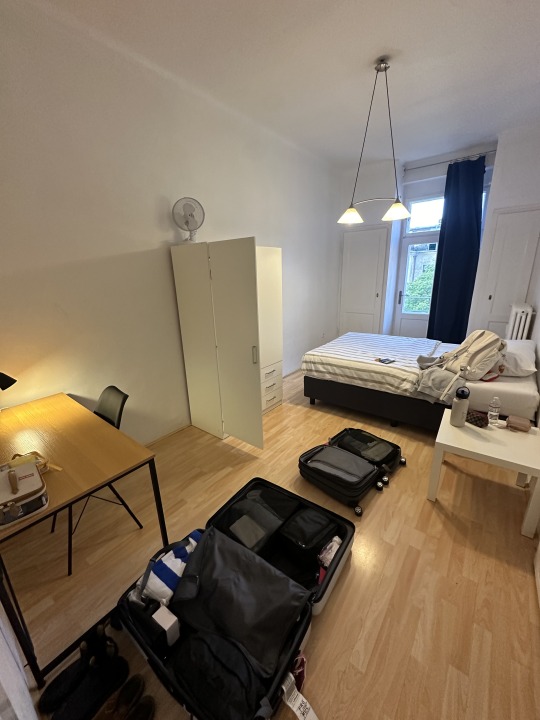
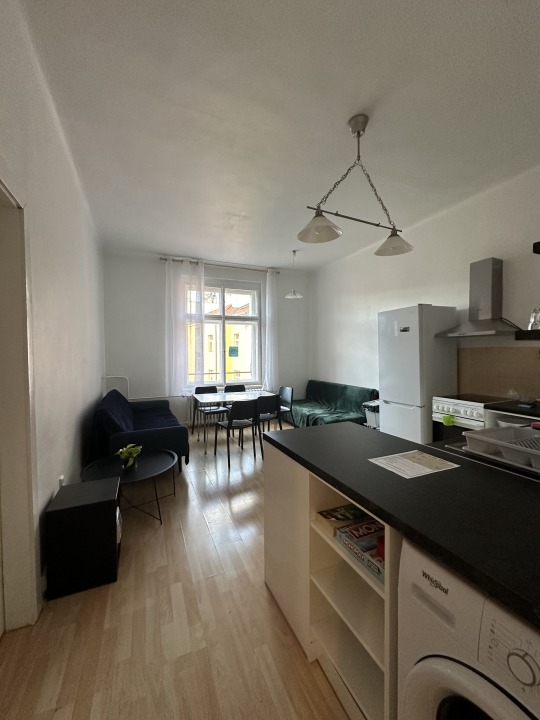
My new home thanks to CEA CAPA!! Love love love.
My two classes here, Linear Algebra and Art & Architecture in the Golden City, have been really enjoyable. The Golden City class is especially cool since the class is structured as field days every class where we explore historical sites and museums around Prague. These classes have also been such a great opportunity to meet people in my program!! I only have classes Monday, Tuesday, and Wednesday, so my 4-day weekends are dedicated to Prague’s nightlife and traveling around Europe! (I’m currently writing this blog as we wait for our train to Vienna, so stay tuned for that in my next post yay!)
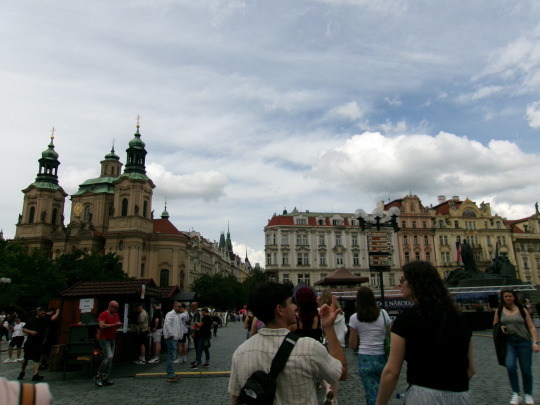
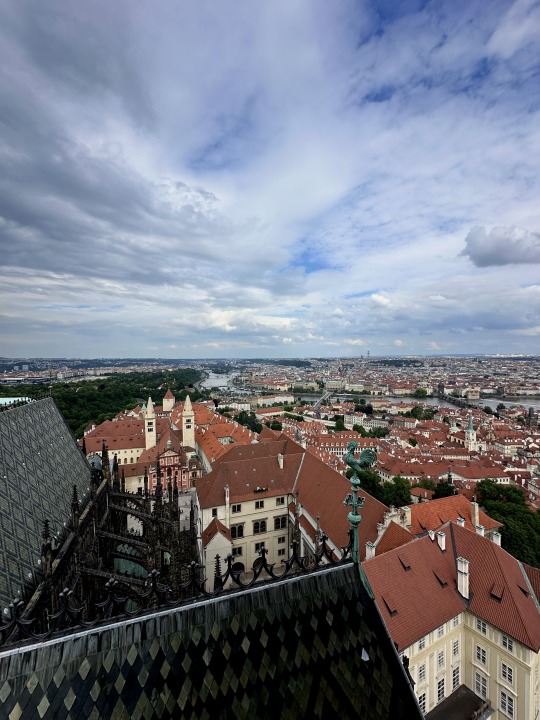
Old Town near the program's center. && Visiting the Prague Castle with my Golden City class.
There are endless pluses about Czech culture, but I’ll talk about some that stick out the most to me. Compared to my hometown in LA, everything here is so much cheaper. I can get a high quality cup of coffee here for around 60 korunas (about 3 bucks) or a fat loaf of fresh bakery bread for about 2 bucks. Almost every local I’ve met also speaks English, which makes it super easy to get around. I feel like Czech is such a different language than English, so I was surprised to realize that even the older generation here is bilingual. On top of the walkability of this city, the public transportation here is unmatched to that of America. I got a monthly public transportation pass in Prague, allowing me to ride trams, subways, and buses. And the food here: amazing. I have yet to try traditional Czech food, but I was surprised by the amount of ethnically diverse foods. So far, my favorite eating out meals have been Thai food and Italian food.
The nightlife scene in Prague doesn’t even compare to home. From clubs to beer gardens to Irish pubs, my friends and I have leaned into the younger drinking age (responsibly of course). There’s always something going on at night, so it’s hard to be bored here. I have absolutely loved all the people I’ve met both locals and students through the program. There’s a stigma that Europeans hate Americans, but I feel like Czech people are so welcoming and friendly.
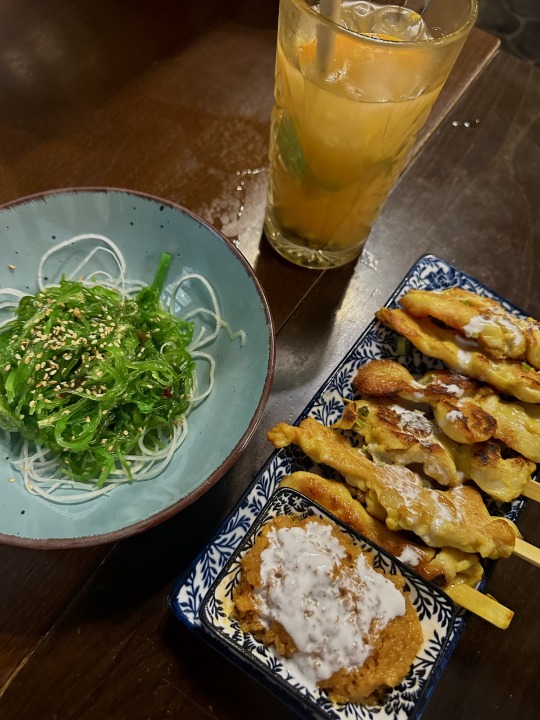
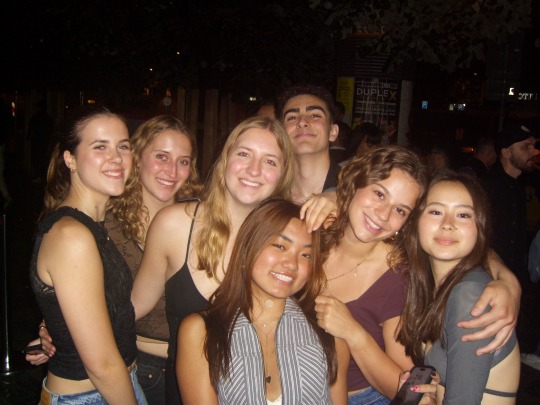
Thai dinner. && Going out (love my roomies).
This was a long second blog oops (just so much to talk about!). If you made it this far, thanks for reading!! Nashledanou for now!
Jules Hwang
Industrial and Operations Engineering
Engineering in Prague
0 notes
Photo
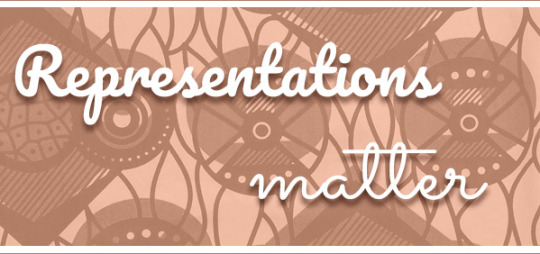
I wanna thank you all for this absolutely amazing enthusiasm you show for my African Love collection ♥. It’s obvious this collection is inspired by Western-African cultures, which really deserve more highlights, because they’re so rich, so diverse, and have so much to bring to the world. So I wanna share this message by @cyberqueen-13 with their permission:
“Your African Love African inspired formal collection brings joy to my heart. I have been saving up to visit Africa for the first time since this pandemic stuff started. I follow a lot of youtubers that live in Ghana now and I pray I get to go this year. I just have a strong desire to be with my ppl. Anyway, didn't mean to go on and on, but thank you so much for this content. I need more pride in my own culture in my game. So, if you have other ideas for more African inspired formal wear or African inspired cc I would be interested. The blue headpiece is my favorite. She looks so classy, such a queen. Thank you. Have a great day!”
"I need more pride in my own culture”. This is so important! And many, many people can relate to this. Im an art lover since childhood, and became an art student then an art teacher. During my studies, the ONLY African-American and Caribbean artist I heard of was Basquiat, and NOT A SINGLE African artist was mentioned. When I wrote an essay about the Senegalese sculptor Awa Seyni Camara, my professor admitted he couldn’t evaluate nor grade my work as he didn’t have enough knowledge of my topic. And then there was this obnoxious art history professor who answered this when I was asking why a whole continent was excluded of our studies: “Well, there’s nothing really important artistically and culturally speaking that happened in Africa”. Really??!! So what about the Baoule incredible sculptures? What about the stunning Dogon creations, who did btw absolute wonders in term of doors and locks engineering? So yes it’s just a bunch of pixel clothes and it’s just some CC, but behind there’s the hope some cultures will be more known and shine wolrdwide, because there’s thousands and thousands of years of creations, ideas, amazing aesthetics, ingeniosity and more in these beautiful cultures. And so damn good tasty food to die for. Try a mafé and you’ll know how heaven tastes like. And please send lots of good vibes to cyberqueen-13, we all hope you can do your travel soon ♥
76 notes
·
View notes
Text
3/4ths Japanese Black Kids - Am I Whitewashing?
@meadyouthere asked:
Hi! I'm trying to make an isekai manga with a pair of siblings as the protagonist and antagonist. The fantasy setting they're in has predominantly black humans, and the king of the humans fell into Japan decades ago, fell in love with a Japanese woman, and settled down. Present day, the two siblings are his grandkids, but being 3/4ths Japanese, they'd have lighter skin than the other humans. I'm worried that this will come across as whitewashing my protagonists. How can I design them tactfully?
I have a #SpicyTake, and that is that most isekai stories are Trash and I don’t encourage people to use Japanese isekai stories as models for story-telling with diversity. Yes, I read my Tensura in my secret room wearing a plague doctor’s mask to hide my shame like any other self-respecting individual, but the premise that otaku Yamada Taro/ X-ko can be yeeted into a world of which they have no knowledge of the cultures, history and people and still fix all the problems via their Yamato Japanese Common Sense and understanding of JRPG conventions is rather paternalistic, no?
Keeping in mind that I am thoroughly biased against this concept, I will also note that your view on how genes and skin color work is very problematic. East Asians and Black people (and Black East Asians) come in a range of skin tones. Phenotypic expression of skin pigmentation is not as simple as “Add more Japanese genes, get paler skin” (No matter what Japanese media tries to imply). Remember, “Japanese” is a national designation rather than an ethnic one. The average Japanese person shares genes with people from SE Asia, E. Asia, and (post-WWII) many other parts of the world. A Japanese teenager today would have grandparents who were born during the end of World War II. Do you know who else was in Japan at the end of World War II? A whole lot of American troops. Quite a few of them had kids with Japanese women.This had Consequences, given bias against mixed race children during that era, as well as Japanese nationality rules that restricted citizenship to children with two Japanese parents until 1985. The result was thousands of stateless mixed-race (Primarily Black) children being born in Japan for over 40 years. Think to yourself: what sort of logistic hurdle are the grandparents of these children likely to face when their family wouldn’t have been eligible for health insurance or have been allowed to attend public school? Or open bank accounts? Vote in elections? What are the long term implications for their prosperity? Just some food for thought.
Japanese identity and issues of race, nationality, appearance, the political implications of challenging national norms of homogeneity are all quite thorny. I’m not saying don’t write this, but I can’t help but view most isekai stories as the junk food of fiction. Great snack, poor meal, and these issues require quite some time to chew on.
- Marika.
While for this ask in particular we could expand on the Japanese cultural context of why this is additionally flawed, if you’d read the mixed race tag or search keywords like “light mixed” you would have found that we’ve already discussed the topic of mixed=/=light(er).
Subverted Absent Black Father + Single Black Mother
Mixed Characters and Royal Privilege (Latina x white, Middle Eastern x white)
It sure pays to read the blog!
~ Mod Rina
We open up the comments for this ask to our Japanese followers, particularly our Black-Japanese followers. Non-Japanese followers, please do not comment.
249 notes
·
View notes
Text
Antonia’s Farmer’s Market Stand
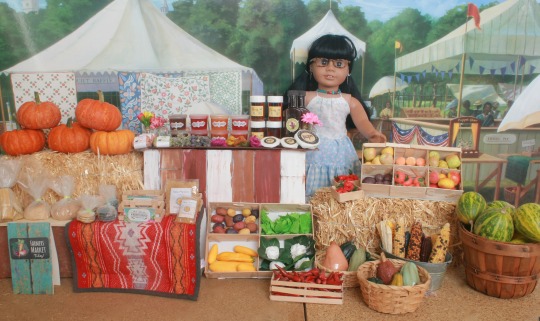
The latter half of October brings the last days of the growing season, and Antonia is so excited to have a stand at the local farmer’s market. Her family helps operate a community garden that grows healthy fruits and vegetables to distribute to families in need, free of charge. Most years, there is not only enough for everyone, but even some surplus crops. Those are sold to raise money for people who need financial help in other ways besides food, such as college tuition, home improvement, or utility bills.
Antonia’s historical year is 1978. She is growing up in the founding years of the American Indian Movement sweeping the United States and Canada, when long-standing discriminatory practices and cultural oppression were being challenged. Antonia felt inspired to do her part at the community level, and that’s why she and her family began their community garden: to teach self-sufficiency, to promote healthy eating, and to strengthen generational, family, and tribal bonds.
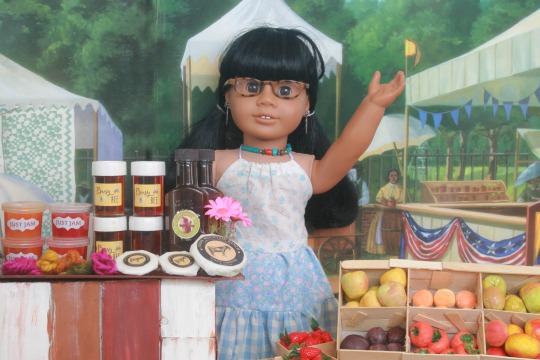
This year’s harvest was abundant and diverse! Antonia is proud to show off all of the colorful crops she helped to raise, as well as a few of her other handmade goods. You might remember her setup last year, which wasn’t nearly as big as it is now! She brought in quite a few new things to sell.
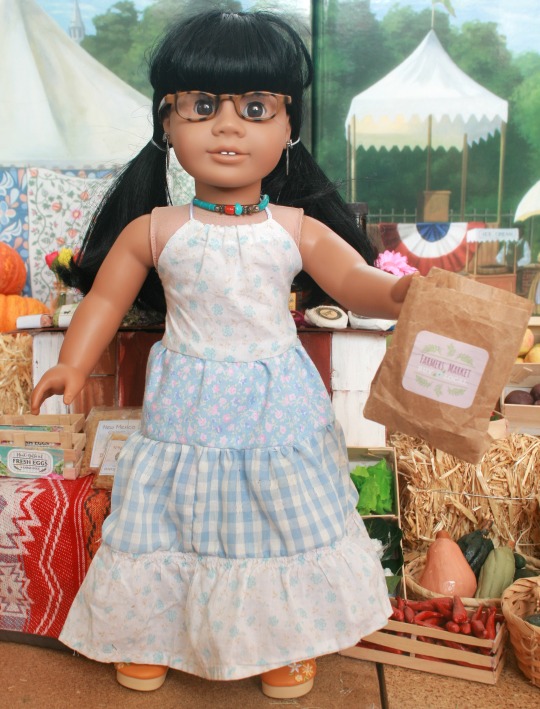
She also wanted an excuse to wear this new mix-print maxi dress that I made for her. I based it off of a similar dress in Julie Albright’s collection. Maxi dresses and calico were popular in the 1970′s as a nod to the United States’ bicentennial celebration. Her platform sandals are also a trend of that decade.
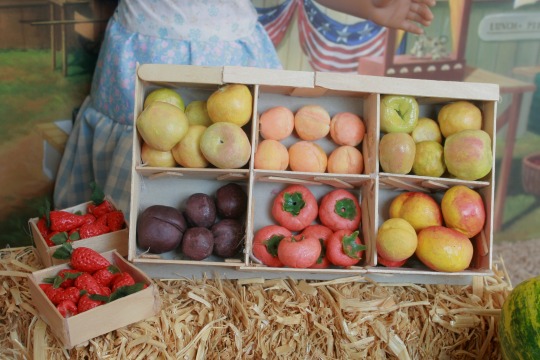
Over here are the juicy red strawberries, tomatoes, and orchard fruits: apples, apricots, peaches, and plums.
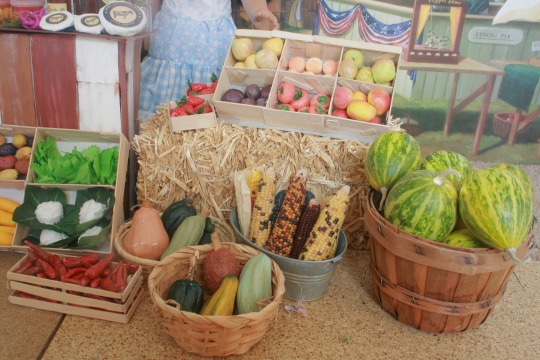
Below the orchard fruits are some of the larger crops. Melons over on the right, colorful corn in the middle, heirloom squash in the baskets, and a whole crate of red chiles.
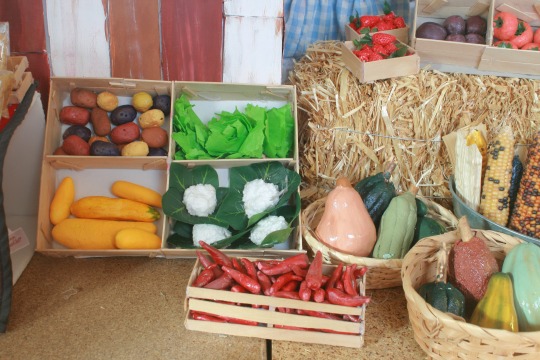
Next to that are the cauliflowers, yellow squash, and lettuce, and four colors of potatoes: red, brown, yellow, and purple!
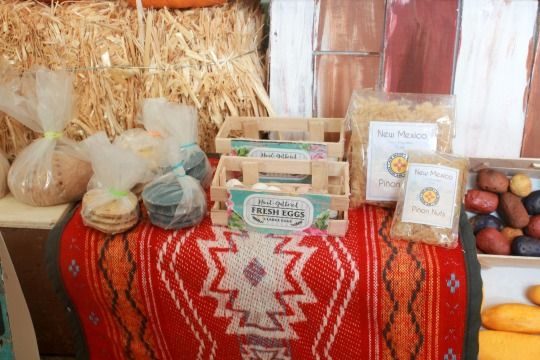
On the left side of the tablecloth are bagged blue corn and yellow corn tortillas, fresh eggs by the dozen, and piñon nuts.
The eggs come from Antonia’s flock of three plucky little hens.
Keep reading below the cut to see the rest!

Piñon trees, common in the mountain west states, bear a nutritious and delicious nut that people and animals love.
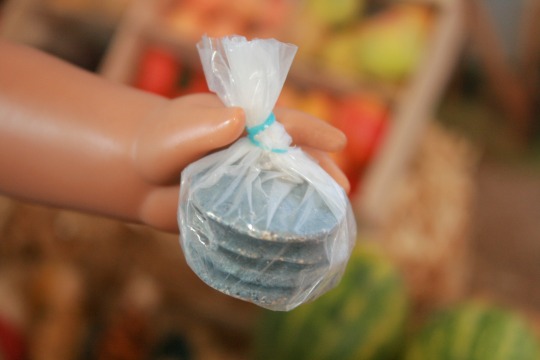
Blue corn tortillas are another New Mexican specialty. After grinding the blue corn and mixing it with lime (the mineral, not the fruit), Antonia flattens the dough into a small circle, then cooks each one on a hot skillet.
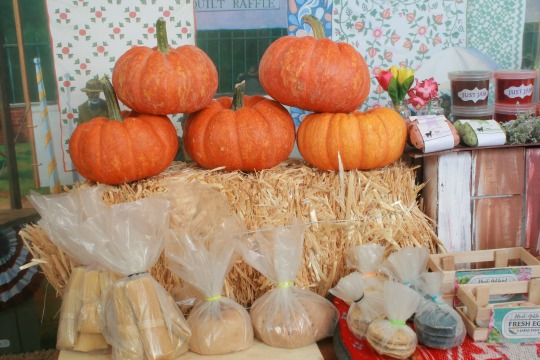
Antonia was very pleased with how big her pumpkins grew this year! In front of them are bags of green chile tamales and freshly-baked oven bread.
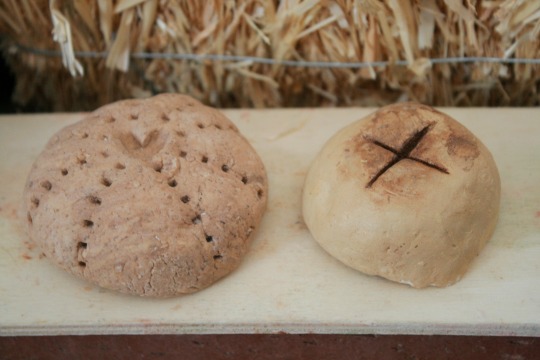
Oven bread is another traditional food you’ll only find in New Mexico. It’s a round, soft loaf that’s cooked in an outdoor oven called an horno (the h is silent in Spanish words, so say it like or-no). You might have seen that big, beehive-shaped oven in Josefina Montoya’s stories. Those are still very commonly seen in yards in front of homes on any pueblo even nowadays. (This article shares a lot more about the fascinating story behind oven bread!)
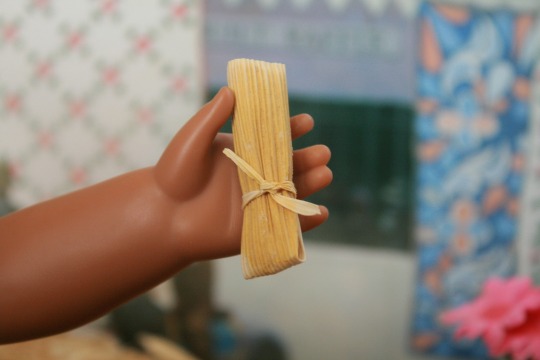
Tamales are sort of like dumplings made with a ground corn dough mixed with lard or shortening, as well as fillings like meat, cheese, and chiles. Then it’s wrapped in a cornhusk and steamed for a few hours until the dough is firm. They’re eaten year-round, but especially in the Christmas season.
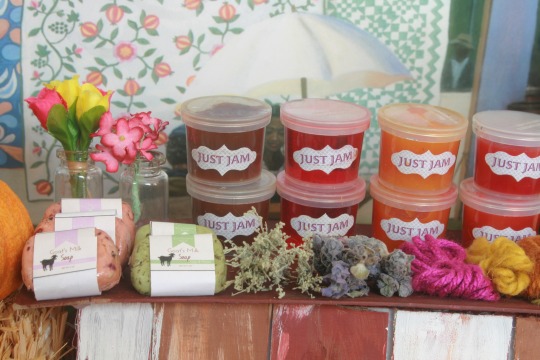
On the counter next to the pumpkins are fresh flowers, jams, soaps, bundles of herbs, dyed yarn....
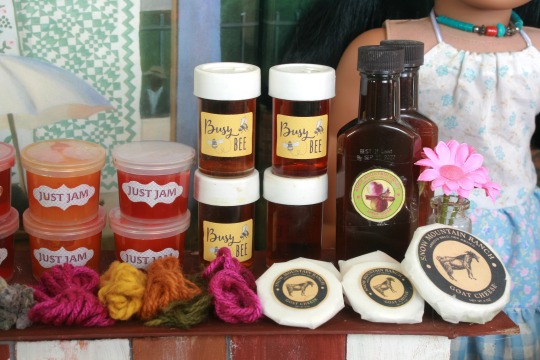
....honey, apple cider, and goat cheese! The apple cider came from apples grown in Antonia’s orchards, and the cactus flower honey was made by the bees that live on her farm.
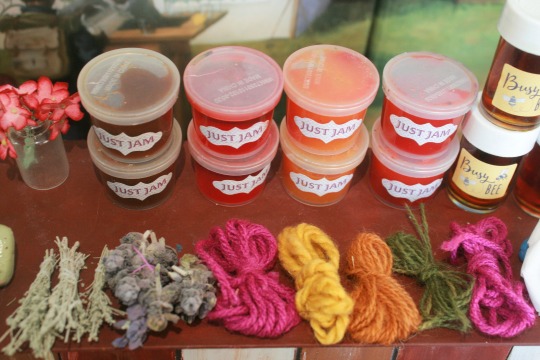
In the jam jars are pumpkin butter, prickly pear fruit jelly, apricot jam, and strawberry jam. Prickly pear cactus fruits grow wild in brushy or sandy areas. They have a bright red or magenta color when the juice is squeezed out.
Antonia spun the yarn from wool given by her lambs. She then dyed them with flowers and other plant materials. To the left of the yarn are bundles of sagebrush and lavender. Both of these plants have a delightful scent, and can be tucked into linen drawers to keep them smelling nice.
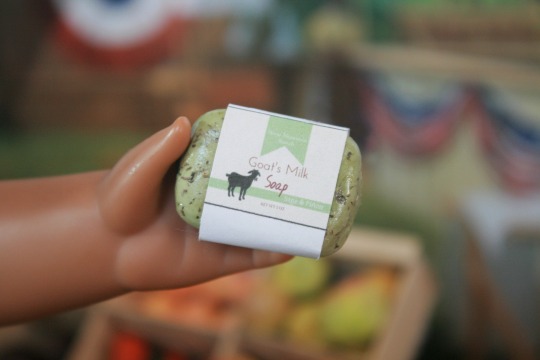
The soaps are made with milk given by Antonia’s goats, and mixed with sagebrush and piñon needles. The pink soaps on display are made with lavender and wild rose petals.
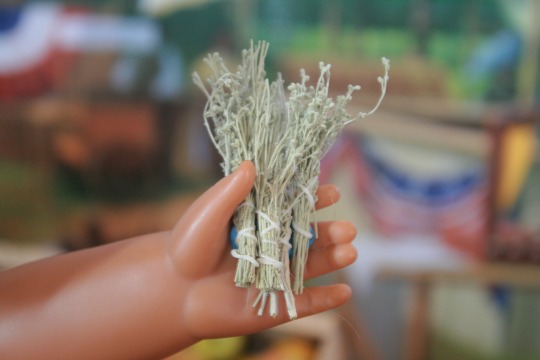
Sagebrush grows wild in open, sandy areas all around New Mexico, most commonly at higher elevations. It’s often burned in religious rituals; you might have heard about sage smudging, or filling a space with sage smoke to cleanse it of negativity and bad feelings. It also has medicinal uses.
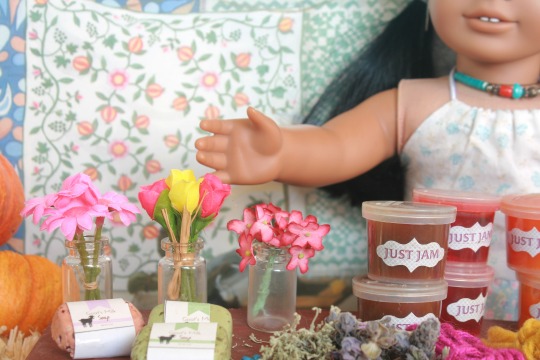
The fresh flowers also came from Antonia’s garden. They’re her favorite thing she’s selling today. They’re so bright and cheerful-looking! She’s so happy when customers notice them and want to buy them.
Now that you’ve had a look at everything, what’s your favorite thing here? Antonia will be happy to bag it up for you.
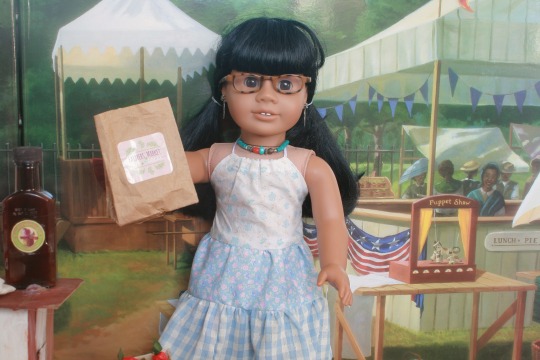
She thanks you for shopping here and supporting her small business!
73 notes
·
View notes
Text
Creator’s spotlight: alifeincoffeespoons
It’s September and our fourth Creator’s Spotlight is here! We are so happy to share with you today the thoughts of a wonderful creator: @alifeincoffeespoons. We’ve rec’ed her fic Sirius and Harry go to Whitecastle here and we did the description for one of her artworks here (which includes the rec of some mitski songs!!).
As usual, here you have one of our favorite quotes of the interview, and under the cut you can read the full interview!
“Remus and Sirius understand each other on a level that few other characters in the series do. They have so many shared experiences and so much history, and there’s so many different ways to write them as a result. They are also foils, but somehow also a matched pair — they move in sync so easily.”
alifeincoffeespoons prompt: “It’s a rare sunny day when Remus sees Sirius, for the first time in three years, and he has to resist the urge to call emergency services immediately and announce that he needs to be hospitalized on account of a broken heart.”
Q: Tell us a bit about yourself
A: My Tumblr username is alifeincoffeespoons (inspired by Eliot’s “The Lovesong of J. Alfred Prufrock”) and I go by spellingmynamewrong on AO3. I’d probably be considered part of Gen Z, and I’m Asian-American, which inspires a lot of my work. I usually create works of writing, though I also dabble in fanart occasionally. I’m a fan of both modern and canon divergent AUs; I’ll write canon compliant content occasionally but not very often, given how tragic canon is.
Q:How did you start creating in the fandom? What did you wish to bring into the fandom?
A: I started writing back in middle school, and I’ve been reading and writing fanworks on-and-off since then. My first work of fanfiction was for Harry Potter too, although I didn’t start writing for Wolfstar until later on. I want to write works that make people think more deeply about — and even critique — the existing world of Harry Potter. There are a lot of deeply problematic aspects of the original work, as we all know, and I think we have an obligation as creators to call them out and demonstrate why they are so problematic.
Q: What things about Sirius/Remus as characters or in their relationship inspire you to create around them?
A: Remus and Sirius understand each other on a level that few other characters in the series do. They have so many shared experiences and so much history, and there’s so many different ways to write them as a result. They are also foils, but somehow also a matched pair — they move in sync so easily.
Q: What things would you like to highlight about the Wolfstar fandom and your experience in it?
A: It’s such an expansive fandom! That’s one thing that’s dawned on me over time — it has so, so much history, and so many individuals are or have been involved in it.
Q: What type of content do you wish you saw more in the fandom?
A: I’d love to see more content that deals with the historical circumstances of the wider world around them — I’m a big sucker for historical fiction and real-world context. If we’re going for a particular sort of story, I’d love to see more superhero AUs. Also, a Good Omens AU. I saw fanart for it once and it’s never left my mind. There are so, so many possibilities there.
Q: What is your favourite wolfstar fan content (fic/fanart/gifset/etc) and how does it inspire you?
A: This is so hard to choose! Let’s go with some tropes instead — I love fix-it fics, and I also find canon divergent AUs very interesting, particularly ones that involve giving Harry a better life. I’m also a big fan of Modern AUs, though. I also love humor — whether that be a full-on humor fic or just one with humor interspersed lovingly throughout.
Q: Which of your own identities inform your creative processes? How has that process been for you?
A: My Asian-American identity likely informs my creative process the most. There are so few Asian characters represented in media still, particularly fan-created content, and I’d like to see that changed. What I usually do is incorporate small details that can feel universal but also give readers an insight into a particular culture — usually through food or similarly common experiences. It comes fairly naturally, actually, since I often write about Asian or Asian-American characters in my original fiction as well.
Q: What advice do you have for other content creators with diverse backgrounds in the fandom? What would you say to people that might feel they don’t have the “right” experience to participate in the creation of content related to Wolfstar?
A: If you’re comfortable, definitely share your experiences — we always need more diverse voices in fandom. I don’t think there’s any particular history or characteristic you need to be an active participant in Wolfstar fandom.
Q: How could we build a more diverse fandom?
A: Firstly, by seeking out and supporting content that features characters with diverse backgrounds. Secondly, by calling out rhetoric that marginalizes diverse creators. Thirdly, by doing our best to do better ourselves.
Q: What’s your favorite thing to modify in Sirius’s or Remus’s characterizations to bring new perspectives to them?
A: I’ve often written Sirius as Asian, mostly because I think it truly does add another layer to his characterization. I’ve explained some of my reasoning behind that in this Tumblr post I wrote eons ago. I often also write Remus as Jewish — I saw this headcanon a long time ago and it’s stuck with me since. My characterizations of them are always shifting, though, and I’m sure they will continue to over time.
Q: What does diversity mean to you? What does that encompass in fannish spaces?
A: Diversity doesn’t just mean including a POC in your work or an LGBTQ character; it means giving them meaningful, non-stereotypical narratives and characterization. In fan spaces, that means supporting creators from diverse backgrounds and works featuring well-written, diverse characters. It also means, as a creator, doing research on the cultural backgrounds of characters you are writing about, particularly if you do not belong to that culture yourself.
Q: Is there a resource you would recommend for fans to read when it comes to learning about diversity?
A: If you’re interested in learning more about Asian-American culture and diversity in particular through literature, two memoirs I read recently and enjoyed were Cathy Park Hong’s Minor Feelings and Michelle Zauner’s Crying in H-Mart. I think they give insight into the Asian-American experience and are also incredibly moving. There are lots of resources for writing out there, on Tumblr, Reddit, and elsewhere. Also, sensitivity readers, if you are a writer, are critical.
Q: Is there a project/organization that you want to hype?
A: Given what’s been happening in Texas and in countless other states across the U.S. — horrific attacks on bodily autonomy and the right to choose — please donate to Planned Parenthood.
Q: Any cause that you want fans to know about so that they can support it?
A: Rental assistance — the Supreme Court recently struck down Biden’s eviction moratorium. If anyone you know is at risk of being evicted, please direct them to local and state rental assistance programs (a tool to search for them: https://www.consumerfinance.gov/coronavirus/mortgage-and-housing-assistance/renter-protections/find-help-with-rent-and-utilities/).
Q: Leave us with a quote or work of art that always inspires you.
A: Whenever I need to write, I’ll put on a Phoebe Bridgers song if it’s a sad section I’m writing, and if it’s a relatively happier section, I’ll put on a NIKI song. Other artists that inspire me: Mitski, Lorde, Lucy Dacus, Taylor Swift, Lily Allen, and Lizzo.
22 notes
·
View notes
Link
Ma Kyal Sin loved taekwondo, spicy food and a good red lipstick. She adopted the English name Angel, and her father hugged her goodbye when she went out on the streets of Mandalay, in central Myanmar, to join the crowds peacefully protesting the recent seizure of power by the military.
The black T-shirt that Ms. Kyal Sin wore to the protest on Wednesday carried a simple message: “Everything will be OK.”
In the afternoon, Ms. Kyal Sin, 18, was shot in the head by the security forces, who killed at least 30 people nationwide in the single bloodiest day since the Feb. 1 coup, according to the United Nations.
“She is a hero for our country,” said Ma Cho Nwe Oo, one of Ms. Kyal Sin’s close friends, who has also taken part in the daily rallies that have electrified hundreds of cities across Myanmar. “By participating in the revolution, our generation of young women shows that we are no less brave than men.”
Despite the risks, women have stood at the forefront of Myanmar’s protest movement, sending a powerful rebuke to the generals who ousted a female civilian leader and reimposed a patriarchal order that has suppressed women for half a century.
By the hundreds of thousands, the women have gathered for daily marches, representing striking unions of teachers, garment workers and medical workers — all sectors dominated by women. The youngest are often on the front lines, where the security forces appear to have singled them out. Two young women were shot in the head on Wednesday and another near the heart, three bullets ending their lives.
Earlier this week, military television networks announced that the security forces were instructed not to use live ammunition, and that in self-defense they would only shoot at the lower body.
“We might lose some heroes in this revolution,” said Ma Sandar, an assistant general secretary of the Confederation of Trade Unions Myanmar, who has been taking part in the protests. “Our women’s blood is red.”
The violence on Wednesday, which brought the death toll since the coup to at least 54, reflected the brutality of a military accustomed to killing its most innocent people. At least three children have been gunned down over the past month, and the first death of the military’s post-coup crackdown was a 20-year-old woman shot in the head on Feb. 9.
The killings have appalled and outraged rights advocates around the world.
“Myanmar’s military must stop murdering and jailing protesters,” Michelle Bachelet, the top human rights official at the United Nations, said Thursday. “It is utterly abhorrent that security forces are firing live ammunition against peaceful protesters across the country.”
In the weeks since the protests began, groups of female medical volunteers have patrolled the streets, tending to the wounded and dying. Women have added spine to a civil disobedience movement that is crippling the functioning of the state. And they have flouted gender stereotypes in a country where tradition holds that garments covering the lower half of the bodies of the two sexes should not be washed together, lest the female spirit act as a contaminant.
With defiant creativity, people have strung up clotheslines of women’s sarongs, called htamein, to protect protest zones, knowing that some men are loath to walk under them. Others have affixed images of Senior Gen. Min Aung Hlaing, the army chief who orchestrated the coup, to the hanging htamein, an affront to his virility.
“Young women are now leading the protests because we have a maternal nature and we can’t let the next generation be destroyed,” said Dr. Yin Yin Hnoung, a 28-year-old medical doctor who has dodged bullets in Mandalay. “We don’t care about our lives. We care about our future generations.”
While the military’s inhumanity extends to many of the country’s roughly 55 million people, women have the most to lose from the generals’ resumption of full authority, after five years of sharing power with a civilian government led by Daw Aung San Suu Kyi. The Tatmadaw, as the military is known, is deeply conservative, opining in official communications about the importance of modest dress for proper ladies.
There are no women in the Tatmadaw’s senior ranks, and its soldiers have systematically committed gang rape against women from ethnic minorities, according to investigations by the United Nations. In the generals’ worldview, women are often considered weak and impure. Traditional religious hierarchies in this predominantly Buddhist nation also place women at the feet of men.
The prejudices of the military and the monastery are not necessarily shared by Myanmar’s broader society. Women are educated and integral to the economy, particularly in business, manufacturing and the civil service. Increasingly, women have found their political voice. In elections last November, about 20 percent of candidates for the National League for Democracy, Ms. Aung San Suu Kyi’s party, were women.
The party won in a landslide, trouncing the military-linked and far more male-dominated Union Solidarity and Development Party. The Tatmadaw has dismissed the results as fraudulent.
As the military began devolving some power over the past decade, Myanmar experienced one of the most profound and rapid societal changes in the world. A country that had been cut off from the world by the generals, who first seized power in a 1962 coup, went on Facebook and discovered memes, emojis and global conversations about gender politics.
“Even though these are dark days and my heart breaks with all these images of bloodshed, I’m more optimistic because I see women on the street,” said Dr. Miemie Winn Byrd, a Burmese-American who served as a lieutenant colonel in the United States Army and is now a professor at the Daniel K. Inouye Asia-Pacific Center for Security Studies in Honolulu. “In this contest, I will put money on the women. They are unarmed, but they are the true warriors.”
That passion has ignited across the country, despite Tatmadaw crackdowns in past decades that have killed hundreds of people.
“Women took the frontier position in the fight against dictatorship because we believe it is our cause,” said Ma Ei Thinzar Maung, a 27-year-old politician and former political prisoner who, along with another woman the same age, led the first anti-coup demonstration in Yangon five days after the putsch.
“Even though these are dark days and my heart breaks with all these images of bloodshed, I’m more optimistic because I see women on the street,” said Dr. Miemie Winn Byrd, a Burmese-American who served as a lieutenant colonel in the United States Army and is now a professor at the Daniel K. Inouye Asia-Pacific Center for Security Studies in Honolulu. “In this contest, I will put money on the women. They are unarmed, but they are the true warriors.”
That passion has ignited across the country, despite Tatmadaw crackdowns in past decades that have killed hundreds of people.
“Women took the frontier position in the fight against dictatorship because we believe it is our cause,” said Ma Ei Thinzar Maung, a 27-year-old politician and former political prisoner who, along with another woman the same age, led the first anti-coup demonstration in Yangon five days after the putsch.
“That was the time I committed myself to working toward abolishing the military junta,” she said. “Minorities know what it feels like, where discrimination leads. And as a woman, we are still considered as a second sex.”
“That must be one of the reasons why women activists seem more committed to rights issues,” she added.
While the National League for Democracy is led by Ms. Aung San Suu Kyi, its top ranks are dominated by men. And like the Tatmadaw, the party’s highest echelons have tended to be reserved for members of the country’s ethnic Bamar majority.
On the streets of Myanmar, even as the security forces continue to fire at unarmed protesters, the makeup of the movement has been far more diverse. There are Muslim students, Catholic nuns, Buddhist monks, drag queens and a legion of young women.
“Gen Z are a fearless generation,” said Honey Aung, whose younger sister, Kyawt Nandar Aung, was killed by a bullet to the head on Wednesday in the city of Monywa. “My sister joined the protests every day. She hated dictatorship.”
In a speech that ran in a state propaganda publication earlier this week, General Min Aung Hlaing, the army chief, sniffed at the impropriety of the protesters, with their “indecent clothes contrary to Myanmar culture.” His definition is commonly considered to include women wearing trousers.
Moments before she was shot dead, Ms. Kyal Sin, dressed in sneakers and torn jeans, rallied her fellow peaceful protesters.
As they staggered from the tear gas fired by security forces on Wednesday, Ms. Kyal Sin dispensed water to cleanse their eyes. “We are not going to run,” she yelled, in a video recorded by another protester. “Our people’s blood should not reach the ground.”
“She is the bravest girl I have ever seen in my life,” said Ko Lu Maw, who photographed some of the final images of Ms. Kyal Sin, in an alert, proud pose amid a crowd of prostrate protesters.
Under her T-shirt, Ms. Kyal Sin wore a star-shaped pendant because her name means “pure star” in Burmese.
“She would say, ‘if you see a star, remember, that’s me,’” said Ms. Cho Nwe Oo, her friend. “I will always remember her proudly.”
65 notes
·
View notes
Note
Hi!
I was inspired by your asks, so I wanted to hear from you! What do you think of Canada as a country? I had a bit of a Canadian phase long ago and I tried to consume as much literature and history as I could, but reading about a place and living in it are very different experiences, so is there anything you'd like to share about Canada, about the culture or the people? Do you like living there? What are some of your favorites things? How do you survive the winters?
And also, as a character, what do you think of Matt?
(´。• ᵕ •。`) ♡
Aaaaaaaaah okay okay *ahem*
If you’re not here for a Ted talk the exit is to your left, have a great day!
I do love Canada very much! I was born and pretty much grew up here, and as I’ve grown older I’ve become more and more grateful for everything that my country has provided for me! I remember my history teacher in high school said once that by being born into the middle class and as a Canadian, you’ve already won the lottery of life. That was not to disparage other countries, but to remind us of how remarkably privileged we are and how much we take for granted.
One of the first things you hear when you ask people what does it mean to Canadian is the word “multicultural.” I find this word realllyyyyyy cringeyyyy and not really reflective of reality, but I suppose it’s a good starting point for more in depth discussion. People often say Canada is a “cultural melting pot”, but the indigenous poet Marilyn Dumont pointed out in her poems that in some ways it’s more of a mosaic — there are many cultures, but they don’t always meld together. To say it’s a melting pot is ignoring the fact that racism and discrimination certainly have and do still exist here.
But I would argue that in some areas it is a “melting pot”, even if I kinda hate that word. I prefer to think of where I live as cultural delta — a place where many mighty tributaries meet as they thunder into the sea. (It is also literally a delta, funnily enough) Here, I grew up absorbing Canadian ideas, studying British history, reading American literature, learning French — but I also grew up listening to Kpop, watching Ghibli, eating rice. When I meet up with friends, we don’t grab a coffee, we grab milk tea. If you ask people here where they would like to visit or live, they will most likely say New York, London, Hong Kong, or Seoul — which tells you a bit about both how powerful and diverse the cultural influences here are.
Perhaps the thing most indicative of Canada’s “multiculturalism” and what I am most grateful for, however, is that I grew up here without fear. I didn’t even know the words “chink” or other words existed until I could access the internet. Recently, the beatings of Asian immigrants in the UK and US brought this home for me — how lucky I am to have such a privileged childhood. And I know this kind of privilege is hard won; in my research of WW2 I found that one of the amusement parks that I used to frequent as a child was built on land that once housed a Japanese internment camp. How fragile our lives are!
But enough about the serious stuff. I can’t really answer your question about how to survive winters in Canada lol, except to say that where I am in Canada it is absolutely necessary everyone own at least 3-4 umbrellas. That’s because this side of the Rockies in BC, the temperatures are pretty mild year round — the coldest it gets is usually 0, and the hottest around 25. But, by god, it rains. I did go to Ottawa in the winter though, where it was -13 one day, but honestly? Everything below 0 feels pretty much the same. Once it gets that cold, you can’t even tell anymore. I wore a skirt and tights that day, with a good, thick winter coat. And I survived :D
Besides not being heckled on the street for being Asian, my favourite things about Canada are probably the amazing diversity of good food and how tremendously beautiful the wilderness here is. And I say this as someone who loses her mind when a mosquito flies past (ie. I am not a nature person). You can kinda tell from these photos here, but the trees and water and whatnot here, are like, real. Maybe I just find that amazing because I lived in Tianjin, but it just feels like this is a city built among the trees and the sky and water that was always here, and not a city where humans have brought in nature for our amusement.
Okay, gotta move on to your other questions or I’ll go on forever. As a state I think Canada does a fairly good job of providing for its own people, but I wish we had a greater global influence. A lot of youth especially express the view that Canada is kinda...boring if your career doesn’t have to do with, like, sports, nature, or medicine, and I would tend to agree. We have great universities, but as someone who studies international relations I often wish Canada would like? Do more? On the global scale. The only thing we really have under our name is the UN peacekeeping, which PM Pearson started after the Suez Canal Crisis. I mean, I’ve heard that many people abroad identify Canada with peace and like ofc I’m not complaining about that, but I just wish our history was a little spicier, ya know? We did kick Americas ass that one time in 1812 and that was amazing. No regrets.
So that brings me to Matt. A lot of Canada’s existence has just been dominated by trying to carve a way between the US and the British while not being swallowed by either. Britain gave us the protection and strength and diversification of identity to not be annexed by the US, but at the same time it hobbled Canada’s relation with our only neighbour. One of the very first treaties Canada negotiated alone, if I’m recalling correctly, was a trade contract with the US over fishing (?) in BC and Alaska, where London was like no you can’t and Canada was like uh we gotta make money too, bro. So yes, while I do believe Mattie is just a very loyal person in general, he was also loyal to the empire because he needed to survive. A lot of Canadian identity was solidified around our prompt assistance of England and the sacrifices made in the two world wars, especially the campaigns in the Low Countries and Italy. Essentially, Canada has historically differentiated itself from the US through its loyalty.
Uuuuh just realized that has nothing to do with my opinion of Matt. Um. I like him? He’s real best friend/big brother material, and I do hc him as far more cunning and capable than canon portrays him to be. However, sometimes he’s just...too nice. He doesn’t have that edge that England has that makes me wanna slap him tf up and sob and call him my baby at the same time. Also, as oumaheroes mentioned here, that kind of selflessness can get pretty toxic. After all, by consistently not voicing or examining your own needs, you make it incredibly and unnecessarily frustrating for the people who care about you to help you, and that creates a relationship just as one sided as one where the person is extremely selfish. Actually, now that I think about it, my biggest gripe with Mattie as a character and Canada as a country is in that word: selfless. Without self. Perhaps because Canada is still so young, but it feels a little lost, a little like it doesn’t know quite know yet why it exists.
TLDR: If you’re under 18 or over 60, Canada is the place to be. If, however, you’re like me and wish you could touch a building that’s over 150 years old and maybe visit a square somebody’s been guillotined in, perhaps try someplace else. Personally Portugal’s golden visa is lookin especially tempting lately
#I’m not on my laptop and I don’t know how to add a cut on my phone#so I’m really sorry if this takes up ur dash#I will fix this as soon as I get home#it’s reining again#thanks for indulging me needcake#ask#also rip i was gonna give book recommendations but tbh does Canada even have literature#I mean we do we DO but#uh have you tried Margaret Atwood? lmfao#i mostly read American and European lit and I feel kinda bad about that#Canadian history is...kinda dry tho idk#maybe it’s cuz I learned it in school
12 notes
·
View notes
Text
Mold on Me
for @dukexietyweek‘s prompt High School, I have no clue how american schools work so I’m just going with what I know.
Summary: Virgil had only heard about Remus as a kid who annoyed his friends in their classes but after finally seeing what the other student looks like and meeting him is torn between hiding away or trying to get to know Remus better. Remus is already decided on meeting the snarky student again, if only to learn his name.
Warnings: Knife mentions, Food mentions?, unsafe science lab practices mentioned,
/\/\/\/\/\
Virgil had been bullied badly when he was younger. It was why he hated being around the more populated areas of the school and now basically lived in the Library as much as he could. That didn’t mean he was against making friends, just that they’d usually be the ones deciding to make friends and he just wouldn’t question it at all.
“He almost blew up the lab today. Why did I have to get partnered with someone who clearly has no regard for any form of safety? Even when I stopped him and tried to correct the experiment from where he’d mixed all the chemicals up he was literally taking the ones I was trying to return to mix together again!” Logan had been ranting for most of their breaktime by this point. Virgil didn’t really mind, and actually was kind of curious about the student in question.
He hadn’t had a class with Remus King before but already knew plenty of views about him, just because his 2 friends shared different classes with him. Logan’s complaints were always regarding some form of danger or safety protocol but Patton’s were where his interest came from.
The food technology class that Patton shared with Remus did have a lot of interesting assignments getting set at various times, including making savoury ice creams near the time of the open evenings so they could, essentially, prank the children wondering if this would be a good school for them to come to next. Patton had somehow managed to make one that tasted delicious but Virgil still couldn’t work out if the flavour combination he’d been told Remus made only sounded disgusting or actually tasted horrible too.
“Dude, surely the teach would have stopped him if it was that dangerous.” Virgil just couldn’t be bothered to add something more to his list of reasons not to trust the teachers. It was already too long for his comfort and Logan was never one to help.
Patton at least caught onto that and came up with a subject to divert their conversation onto for the rest of their break.
/\/\
The next time Virgil thought about Remus was a few days later as their lunch break ended and he was heading into the science block for his physics class. Patton hadn’t made it out to lunch that day since his food technology class was either side of it so they’d have more time for the practical lessons.
It at least made the corridor Virgil was passing down smell delightfully of chocolate but he was far more interested in, and slightly terrified by, the boy kicking the door of the food tech classroom open, storming down the classroom, yelling “It’s knife work! What about that can’t be turned into uses for a weapon? What planet are you from that blades and any work from them isn’t two steps from a use to attack or torture another!”
One last thought Virgil had about Remus was that his friends were disasters at describing what any human looked like. According to Logan, the boy had obviously dyed his hair and ignored any attempt his parents or brother made to teach him personal hygiene. Patton was a little kinder, saying Remus had a lovely wide grin and energetic eyes, although Virgil was still trying to figure out just what that meant.
His mental image so far had been of some slightly crossed-eyed younger version of the Joker from Batman, but the boy fitting all the stories he’d heard of Remus looked nothing less than gorgeous.
“They’re from the Health and Safety state, Dude. We’re meant to have forgotten the threatening uses of knives we use in cooking unless we are the ones being threatened by them.” Virgil muttered his reply, to anxious about being noticed to say it any louder.
He still got noticed and the boy halting in front of him. “Someone in this damn school gets it! Come join us in class!” Virgil didn’t have much of a choice to disagree as his arm was grabbed and he got dragged into the classroom, sheepishly waving to Patton when the other students turned to look at the rapid return.
“Mr King, I’ve told you before that you cannot drag your friends into here even on a lunch break.” the teacher sighed, confirming Virgil’s assumption over who it was.
“I actually was heading to class anyway. There’s only like 2 minutes left before...” Virgil began explaining, tugging on his arm to get it released just as the bell went off to officially end the lunch period. “Yeah. I guess I’ll have to properly meet you some other time, Remus.”
He ducked out of the classroom before anything else could be said, letting the flow of other students heading to class calm the spiralling emotions and only just hearing “No fair, I’ll learn your name next time, Stachybotrys.” yelled after him.
If only the insane boy wasn’t proving to be exactly Virgil’s type perhaps he’d have learnt something about physics that day.
/\/\
Logan was not amused when he reached their table today. “Do either of you know if Remus means a person or the mold when he mentions Stachbotrys? I have had to argue constantly to get any progress on our study for the entirity of our class.”
“I met him for like two minutes. That should not be enough time for him to have anything to say about me.” Virgil growled, hunching back into his hoodie.
“He met Virgil while trying to storm out of food tech yesterday. Apparently our anxious bean muttered something in agreement of what he was yelling about knives.” Patton added what more he could at Logan’s raised eyebrow.
At least amusement was replacing Logan’s frustration now, a smile clearly being held back. “At least I didn’t try suggesting he locates the mold on rice then. Remus does seem rather insistent that and I’m paraphrasing here, he’s going to find and make his the Stachbotrys that is all he could think of last night.”
There aren’t quite words for everything Virgil wanted to say to that, so in the attempt he let out a rather strangled noise, burying his head in his arms. He could take having a crush on a complete whirlwind maniac who seemed to drive both his friends up the wall but having even the merest suggestion the affections could be returned was too much to understand.
“If he brings it up next time we share class I’ll suggest visiting the library to look up the subject, shall I?” Logan offered. Virgil made a mental note that there had now been 3 instances of teasing pushed too much by the boy who insisted he only ever acted logically.
/\/\
“I don’t need to read about mold but my science partner has decided if I’m going to talk about my Stachybotrys so much our experiments can easily be adjusted to focus on mold.” Remus’s voice was loud as he marched over to the helpdesk in the library and Virgil was just grateful he had decided to read at one of the tables hidden among the shelves while waiting for his lift to arrive. “Apparently that means I do need books to source the information I already know so which shelves am I looking for?”
Definitely not the area Virgil was in. The shelves near him included cultures of the world, and how to books for various creative hobbies. The only thing that seemed even remotely likely to interest Remus were the history of war books near the end of the isle but they didn’t connect to mold at all.
Virgil’s reasoning and frantic checking that he could hopefully avoid the other boy distracted him enough that he didn’t realise Remus looking through the shelves opposite him. “Stachybotrys! I found you again!” He couldn’t miss the exclamation though.
“Didn’t realise we were playing hide and seek. I thought I was writing an essay for English Lit.” Virgil hissed back, really not wanting to give the librarian any cause to kick him out.
“Ooh, what’s it on? And what’s your name? You’ve been on my mind like a mold and it would be nice to have the right name for the newest mold I’ve encountered.” Remus clearly didn’t care about making some noise although he did quiet down dramatically when he saw how uncomfortable the noise was making Virgil.
“I’m Virgil though I’m fairly sure you’ve already got my friends convinced Stachybotrys should just be a nickname for me now.” He was actually annoyed at that.
Patton always butchered the word, and would only try to use it when mentioning how besotted he thought Remus was since the only diversion of subject in their food tech class recently had been how the molds of different foods could make people sick or kill them.
Logan on the other hand would just randomly use the name for Virgil in the hopes Remus would be somewhere close by to hear him. That had never worked since Virgil was either in class, outside to eat or in the library.
Remus peered at him a little. “Still fits though. You definitely appear like a threat but ultimately leaving the world undecided over how dangerous you are. So assuming Logan’s one of your friends, who is the other I’ve got calling you it? And do they think I have a chance at dating you?”
“Patton and are you seriously asking me if my friends think you should ask me out? Dude, if you want to date me just ask me if I want to go on a date. Or is being ridiculously convoluted a game of yours?” Virgil scolded, shaking his head, trying to decide if there was some kind of mind game happening in the moment or not.
“Okay then, Date me, Emo kid! We can go ravage a farm search for signs of mold and decay among all their crops and end with a picnic of snacks I invented recipes for in class!” Remus just shrugged at the tone, moving on to what was requested of him,
That was even further from Virgil’s expectations of the response than Logan saying Remus was set on finding him had been. Most people were at least a little put off by how harshly he reacted whe uncertain of situations. “Can we start with the food? My brain will just panic over how I could die from being close to mold and then eating if we do it your way round.”
“Of course we can. Let’s meet at Gorse Hill farm at like 2pm on Saturday for our date then!” Remus jumped up from his spot then, a wild grin on his face as he waved, heading off. “Can’t wait for it, Stachbotrys.”
#dukexietyweek2020#dukexiety#remus sanders#virgil sanders#patton sanders#logan sanders#high school au
82 notes
·
View notes
Text
Academic Elitism: an institutional issue

Sorry for being so rant-y lately, but the elitism of university has been a problem for me from the exact moment I accepted my scholarship with a signature and a handshake in high school. (The scholarship was later revoked due to state up-fuckery, but that’s another story, and I was already in too deep by the time they told me).
My parent’s house was only an hour north, my younger sister had already claimed my room, but I was excited. I was in the furthest dorm building, because that’s where the scholarship kids went, it was like a poor kid diversity hall, every few doors was someone from a completely different background, but we were all poor except our Swedish RA, and there was an odd pride in that. We all had various scholarships: robotics, dance team, nerds like me, etc. (not the football or hockey athletes though, they had their own dorm next to the library for... reasons, lol).
But being the last hall, it wasn’t actually full, most of us had entire rooms to ourselves, often whole suites; our hall was co-ed, but rooms were only occupied at every-other, staggered down the corridor. Only the front two halls were used, the back two closed off for construction or codes or something. We had to hike up the hill for dining halls, which was fine until snowdays that shut the whole campus down (and I mean west Michigan ones, with 4+ feet of powder and ice underneath). I had an old computer my dad got me for graduation and I didn’t know it was old until my peers started calling it a dinosaur. I had to use the library computers to write and print papers, and most places I went, I ran into the other scholarship kids. We didn’t talk much, just a head bob here and there, awareness at our similarities and an annoyed spite at being thrown together this way. It was lonely for everyone.
I had a purple flip phone I’d gotten only that calendar year (2009) and was still learning to text with (abbreviations? instant messaging? what?). My roommate had come down from Alaska to live near her dad, we’d talked in the summer, but I never saw her. I moved my things in and her stuff was on her side, I texted her about going to turn in paperwork and when I came back, there was a note on my bed and all her things were gone, she couldn’t do it, had never been away from home for even a night. She left a few mismatched socks and a bag of junk pens that I resented for years.
Social media was mostly a way to talk to people across campus and exchange homework and party times/locations. We posted over-edited photos of our food and still jogged with our mp3 players and ipods. But within two years, I had to trade in my computer three times and upgrade to a smartphone to keep up with the expectations of communication. Professors would cancel classes by emails an hour out, and if I was on campus, I simply didn’t get the message, running between classes with 19 credit hours and three jobs. Work would call in or cancel my appointments (tutoring) and I needed to be able to communicate at the rate of my peers, so though it wasn’t something we could easily afford, my parents let me get the smartphone and my dad helped me find computers that could keep up with writing papers and researching without having to go to the lab, which saved so much time.
There was little understanding for my suffering. I didn’t have a car, I had to call my parents and organize a time to get home or take the train which was more expensive than waiting around on an empty campus. They were often things that even the wealthiest students had to deal with, but there were so much more of them for us, more stress, more problems, more solutions, more consequences, and in some ways, more determination.
I spent plenty of breaks holed up in my room, but when the swine flu/H1N1 outbreak happened, guess where they quarantined students?
In our hall.
Not the back one that was closed. In the room attached to my suite.
After half a semester alone, suddenly strangers shared my bathroom. I never saw them, I would just hear the formidable click of the bathroom lock followed by the shower. A week later I got a blue half-sheet note in my mailbox about quarantines. The other kids were as pissed off, as we watched kids escorted in with blue masks and were told to just get cleaning wipes from the front desk –they ran out in a week.
We were the recyclable students, brought in to trade scholarships for university grade averages. Many of my friends were struggling with scholarship qualifications and gpas (which only encouraged my continual obsessive perfectionism and involvement).
We were expendable.
I didn’t understand the elitism then, or I did, but I’d twisted it in my head from years tossed between private and public schools. I was an invader, I wasn’t supposed to be there, but I wanted to be. I understood that I didn’t deserve it, that I had to work harder to stay. I completed Master’s coursework for my Bachelor’s degree, finishing two BA programs (anthropology and English: creative writing) and 2 minor programs in philosophy and world lit, lead several campus groups and volunteered with honor’s societies. I spent hours on campus every day, running home just to go to one job or the other. I slept about four hours a night and I still romanticize it because I loved it. And I was good at it. It was a closed system, easy to infiltrate, easy to watch and observe and follow, to feel protected from the world, but there were always ways that I came up short.
I didn’t have leggings or Northface fleeces or Ugg boots or name brand anything (except a pair of converse I got in 8th grade from my Babcia). I had old high school sweats and soccer shirts, hand-me-down clothes from sisters and cousins that mix-matched a style I thought was unique but I now understand screamed I don’t really belong here. Example: I went to propose an independent study to a professor I really admired and I panicked about what to wear. I still cringe at the memory, gahhhhhh, but I pulled on what I thought was a decent dress because it had no rips or stains or tears and though I’d picked it up from a clearance rack, it was the newest thing and therefore the best. But in retrospect, it was definitely a “party” dress, I grabbed a sweater, hoop earrings that had always been beautiful in my neighborhood, and heels I never wore otherwise, and presented my idea. This old professor was just like “um...did you dress up for me?” Clearly spooked by red flags and I realized my mistake. Saved by quick thinking I clarified “no, I have a presentation later,” and being a familiar face in the social sciences department, I let him assume I was dressed up as something. I just went in my sweats and t-shirts after that, got a haircut that tamed the wavy frizz and learned the importance of muted tones, cardigans, and flats.
I made a lot of interesting friends in the process, people who also stuck out from the American Academic culture: exchange students, older (non-traditional) students, rebels, and other poor kids. But that also meant that we all evolved during our time there, so friendship was quick and fleeting as we adapted or dropped out or remained oblivious, lost in our studies and dreams of changing the world or our lives.
I had no idea how to approach the dining halls because I could only afford the bronze plan that was included with my room+board scholarship. I could enter the hall ten times per week, with four included passes to the after-hours carry-out (this was an upgrade from the free high school lunch I was coming from). I met other kids on this plan and their dorm rooms had fridges and microwaves and shelves of ramen and mac’n’cheese. Mine was sparse, my fridge had jugs of water from the filtered tap in the common room, and though it had a shared kitchenette, it always smelled bad or was being used and the nearest grocery store was Meijers which was a 15-20 minute drive from campus. I used so much energy dividing up my meals and figuring out how to sneak food from the hall for later or just learn to not eat, which is another story involving malnutrition, broken bones, and the American Healthcare System.
We like to summarize the college experience with fond struggles. I went back to my old high school to watch my younger sisters’ marching band competition that first year (it’s MI, and they were good). My old art teacher (not much older than we were but she felt so much older at the time, also her maiden name was Erickson and so was her fiance’s so she didn’t “change” her name and that blows my mind to this day), anyway, she stopped me to ask how school was going, and I was not prepared to be recognized in anyway and stammered out something like “oh, yeah, stressful. Fun, cool, yeah,” like the eloquent well-educated student I was. And she said, “oh, I loved it, don’t you love it? Everything’s so charming, and being poor? Oh man, it’s hard for a while, but it’s so good to go through.”
I was dumbfounded at her reference to poverty as a thing to go through when you’re a student. I again had to remember that I was infiltrating places where people weren’t just marginally more well-off than I was, but far beyond, in a place where they couldn’t comprehend an alternative, couldn’t conceive of surviving poverty, of not having a reliable place to fall if you mess up, parents who couldn’t support you if things went wrong, who couldn’t save you from having to drop out if scholarships were canceled because the money just wasn’t there.
Talking with my parents never worked, and I recently found this video by The Financial Diet about Boomer shame in being poor, where many Millennials were united by it and it was #relatable. But all this is to say that there are so many layers and ways we develop in higher education that are often overlooked by the romantic nostalgia of the elite expectation. What we demand from education vs. what it offers us in return is rarely equal for students coming from poverty, and it starts with that first sacrifice of looking at money and deciding it has to be worth it to do something bigger, and that education is a necessary piece of that goal.
Now I live near Brown University, I’ve been to Harvard when we lived in Boston and recently took a trip to Yale with bold expectations. I am friends with several people who work at these places and I hear the same things: so many students are in a place where their obsessions are considered more important than the larger world, an argument that Shakespeare is a woman is more important to prove than the greater issues of sexism in society as a whole, while others are trained to look at data and the world as a pocketable fact-book, going to conferences and week-long summits and then off to D.C. to make important decisions about places they’ve never been to, for people they’ve never met, about problems they’ve never experienced.
It’s not new. It’s not romantic. It’s not nostalgic. It’s just sick.
I was horrified at New Haven. I have read so many social science reports and papers and experiments and academic bullshit that has come from professors at Yale with a big badge of ivy-league validation. So much of this research was focused on homelessness and culture clash and socio-economics in America, as that was my “dissertation” that got me discounted master’s classes for my BA in Anthropology. Anyway, my point was that I thought this noble, proud university that put out so much research was going to be situated in something of a utopia, where their research is put into practice. Obviously, I was wrong, but I didn’t expect how wrong. (I had also started reading Leigh Bardugo’s Ninth House, so... there’s another thing).
My observations were validated by employees of ivy-league schools, who have watched over the past 2 decades as they grow more and more reclusive, hiding away from the public except through a few, probably well-intentioned, outstretched hands that do little to contribute to the world outside the university itself. These ivory towers are built by poaching: environments, observations, resources, research, and yeah, even students.
I love academia. I will sit in a library for hours just pulling down tomes (and putting them back in their proper locations like a dork) and drawing connections just for fun. But right now, I’m a bit bitter and spiteful and angry.
When something like Coronavirus sneaks up on us, we have a tendency to throw the most expendable people under the bus as quickly as we can, and all I can think about is my shadow of a suite-mate sneezing and coughing with swine flu for two weeks, at how I refused to use my own bathroom and listened to my hall-mates’ advice about showering at the rec center a mile away as we all collectively locked our bathroom doors and were left there by the university to get sick without insurance to help with any foreseeable costs.
It’s not the same now, they’ve rebuilt the entire section of the campus, it’s odd to see it, I wonder where they put the expendable kids. Or maybe they don’t accept them anymore. I’ve worked in college admissions since then, and it is a scary industry of politics and preference and hidden quotas and image-agendas. Not all schools are industry monsters, but when you’re expendable, they sure do feel like it, whether you graduate summa cum laude with two degrees, six awards, and five tasseled ropes around your neck or not.
I wish I had a positive message. I wish I was in a place to help people who feel expendable or like they can’t keep up with communications because of technology or language or network or environment. But I don’t have much right now. For all its posturing and linear progression, academia needs to create profit. All I can do is yell about this existing.
If you are feeling expandable in university, I can tell you you’re not alone. I can let you rant about all the small ways your peers don’t get it, whether its an accent they shit on or ceremonies you don’t have the right clothes for or textbooks you share with a friend to cut costs but then they hoard them. I can relate to you about guilt and that sneaking panic that fills you with anxiety at night as you question yourself and wonder if it’s worth it at all, if it’s necessary, if it’s okay to be expendable to follow something that feels bigger. I can validate your doubt and tell you that you’re not actually expendable, you’re a bridge.
I’m sorry it still works like this. I wish we figured out how to change it by now, I wish I had secret shortcuts to tell you about, that there was more accountability or hope, but I’m not seeing it lately. I hope you do. <3
358 notes
·
View notes
Note
Hello Rosy! This might be a difficult ask. Don’t know if you’ve already seen what’s going on on Twitter, but a white reviewer said she couldn’t understand a book because she started reading the sequel without reading the first book. It was a paid review, for a famous magazine. The book was written by a POC, and it was so enraging that suddenly a lot of reviews, written by her, with blatant racism started showing up. She’s said some pretty bad things, such as a white reader not understanding a different culture because it’s too exotic and was presented in a “non-white way”. She also said she clearly wasn’t the best reviewer for that book as she wasn’t of the author’s ethnicity. I think that’s super ignorant, because why can’t a white person try to understand a different culture? Anyway, this got me thinking. I love fantasy, and love it even more when it grabs elements and cultures of our own world. I love learning about different cultures than my own and just get to know them. I’m from a smaller country where most people are honestly ignorant about racism. I tend to believe I can easily put myself in other people’s shoes, and I never understood this white-privilege and need for everything to be about white-culture. I think it’s very dumb when we claim things need to be changed because we don’t understand them because we are white, and so POC should change their stories so we can “relate”. Reminds me of colonialism, tbh. I mean, the world is so beautiful and so diverse? Why do we feel the need to even dictate fantasy stories that way? What I wanted to ask is, as a white person, when does it become racist when trying to get to know another culture? Until a few years ago, I didn’t know the word “exotic” was bad, for example. Is too much enthusiasm bad? As an aspiring writer who’s white cis, when does it become disrespectful to write diverse characters and try to represent their culture in a respectful, truthful way? Thank you, and I’m sorry this is so long. (Didn’t proofread, hope it’s coherent!)
This is a difficult ask. Because it’s complicated and we are all right smack dab in the middle of this cultural upheaval. It’s had to get a clear perspective on it, because we’re drowning in it. I suppose I’ll answer it, not as if I have all the answers, but as if it’s a problem that I am sorting through and sometimes struggling with myself. I have been working on this answer for three five days now so let’s see if I can wrap it up.
I did see the issue going around on twitter but I didn’t read the book and didn’t click on the review, because, well, sometimes I get tired of giving my attention to people who are acting in bad faith about issues of race and diversity. I saw a quote yesterday about the truth of a lot of people acting in bad faith. They can PRETEND they are innocent and ignorant and don’t know what they are doing, but a professional reviewer doesn’t bother reading the first book because it isn’t worth their time and then judges the book based on their ignorance? That’s WILLFUL ignorance. That’s disrespect. Saying they couldn’t understand it because it’s not from a white perspective is both minimizing the humanity of the non white culture, the AOC, and the book, and also putting the white pov, the white audience and the white author ABOVE everyone who is not white.
“I can’t relate to this book because I am not centered and it is not about people who look like me and are white.”
This is part of the “white default” mentality. This mentality says that the REAL human is a middle/upperclass, christian, cishet, abled, western white man, and everyone else is some sort of hyphenated person. The more hyphens, the less they count as human. A book about a hero, is about a white man. A book about a female hero-- or heroine, is a white woman. A Black hero, a Black man. A lesbian Black female hero. A poor, muslim, bisexual, Filipino, single mom... is apparently the kind of person that those at the “top” of the identity food chain can’t conceptualize as having universal human experiences.
Because they are “the other.”
Saying that white people can’t relate to BIPOC in the content they consume is saying that white people and BIPOC do not share the same human experience.
That’s one of the reasons why calling someone ‘exotic’ is problematic. Because it’s othering that person, saying they are odd or weird or unusual, not even in a bad way really, but in a way that makes them NOT a regular human. Perhaps something good enough for an exotic vacation or love affair or a night out at an exotic restaurant. It turns people into consumable goods that aren’t a part of the default human’s REAL world. Exotic is spicy and attractive and sexy and foreign. Something to be explored and then discarded when you go back to your real life.
So yes it TOTALLY is akin to colonialism. And that reviewer, using their entitlement as the basis for their review shows a marked incompetence as a reviewer. That is a BAD reviewer who acted in bad faith to attack authors and stories that were different from their dominant experience.
Okay. So that’s the discussion about the reviewer and the BIPOC authors. Listen, the publishing industry is a MESS, and it has been for years. Publishers, editors, reviewers, marketing, book covers, agents, writing associations and, the worst one for the readers, the writers, too. Yes. It’s awful, every time you turn around you find out something horrible about a favorite creator.
I think it’s because when we create, we use who we are, underneath our polite public personas, to create new worlds and characters. And that’s the part of us that is full of biases and unquestioned prejudices, wounds, resentments, fears and weaknesses. Those things come out in our stories. No matter who we are they do. But also when a person gets power and success, our cutlure allows them to abuse that power, and then we start hearing stories about what our favorite creators do with that power-- and we start to connect that abusive or toxic or racist or transphobic behavior back to the stories, books, movies and shows that they’ve created and then, voila. It’s all painted in black and white on the page or screen or whatever.
I think it’s just part of the vulnerability of being an artist. You put yourself out there to be seen, and that means a lot of your ugliness is visible. We all have ugliness. We’re all raised in a racist world. Not just those who are white and powerful, but also BIPOC who have all that internalized racism or racism against other minorities, or classism or homophobia or whatever. All that stuff is in there.
How do we keep racism and other biases out of our work? We probably can’t get rid of it all, because humans are imperfect. And also, sometimes you want to write ABOUT that imperfection. Flaws are part of what make fictional characters interesting. And sometimes we want to address that. Sometimes we WANT to tell a story without explicitly saying, “this bad and shouldn’t be that way.” There is a reason to write about the bad, hard and unfair things in life, and they shouldn’t necessarily be erased from our fiction.
BUT.
As a writer, at this point in time, you really don’t want to be at the mercy of your unquestioned biases, blindspots, ignorance, bigotry, racism, homophobia, misogyny etc.
We, as authors, want to be aware of how these things affect our writing and stories. So I guess the first step is to be pay attention when we hear about how racism etc is shown in the world and fiction. If you can see the problem of colonialism and exoticism in reviewers or authors, if you can see how taking, say, Chinese culture as a basis for your SF world, but not having any Chinese characters or actors in your show (Serenity/Firefly) is racist, colonialist, unfair, and tbh flawed storytelling, then you have to pay attention when you yourself want to use multicultural elements in your story.
I think one thing you have to look out for as a white author writing about other cultures is a kind of cultural tourism, where you look at other cultures and try to *use* the exotic elements to spice up your story. To indicate “the other.” Or perhaps something that is exotic and consumable. Even stereotypes that seem positive to you, powerful and beautiful and exotic can be dehumanizing. Like the “magical negro,” or the “spicy latina,” or the “tech genius east asian.” Why? Because they’re caricatures, not real people. I have also heard that sometimes using religions in your work is considered offensive because they are closed religions. You have to be a part of them to understand them. I am not sure about this, because I am not from a closed religion. I’m from a buddhist tradition that was missionary in nature. (I however hate proselytizing and it���s one of the reasons I left that religion.)
Being a mixed race, multicultural person from a minority religion, who belongs to many cultures and so doesn’t belong to any, I personally think sharing culture, art, stories and influences is a good thing. I couldn’t exist if we didn’t. And I use influences from all over in my work.
When does this enter into appropriation? I think that is a very good question. Using a native american war bonnet to fancy up your bikini so you can get drunk at a music festival definitely seems like appropriation. Writing a well developed, well rounded Lakota character who’s been well researched and stays away harmful stereotypes... maybe not.
I would NOT write a story attempting to Tell The Truth of what it is to BE another culture. Recently a part Puerto Rican, mostly white author wrote a novel attempting to do that with, I believe, the Mexican immigrant experience, American Dirt, and as far as I can tell, failed miserably. Maybe it was a good story, but it was NOT an authentic tale of the Mexican experience. I didn’t read it, but what I read about it felt as if she thought she could write an expressionist tear jerker about her impression of someone else’s experience. As someone who shares a similar background to that author, I would NEVER have had the temerity to write about that particular story. You’re from NYC lady. What do you know of border crossings? But if I HAD incorporated that experience into my stories (not trying to offer some sort of definitive narrative) I would have done more research from primary sources.
Now all authors are writing about other experiences. Other lives. If not, it would all be scarcely concealed autobiographies. We could only ever write about people who looked like us and came from exactly the same backgrounds and had the same experiences as ours and how boring would that be? This topic is SUPER complicated and I keep thinking about more things to address, but if I keep going I’ll never finish this and it will be too long for everyone to read anyway.
Let’s sum up.
Can you, a white person, write about cultures not your own? Yes. With cautions.
be aware of your own biases and racism and assumptions
don’t attempt to write a definitive experience. Don’t write about what it’s like to BE Black unless you are Black. You can’t know. Even Black people don’t have the same experience.
stay away from negative stereotypes and be on the look out for less negative ones that are still dehumanizing.
don’t consume someone else’s culture and disrespect the people.
remember to keep your BIPOC characters well rounded, realistic, and human. They all have pasts and families and fears and hopes and traumas and careers. Don’t treat them as a prop for your white characters. (although do remember that all secondary characters are there to support the MCs, so this can be tricky.)
RESEARCH. Simply basing a character or culture on someone you know is not enough. You should also be aware of history, culture, other depictions, the conversation about that culture, the voices of the people, etc.
Be willing to take criticism. Anyone writing BIPOC characters or cultures is going to get criticism. Period. It’s gonna happen, whether you’re a white author or a BIPOC. Sometimes AOC are more inspected than white authors. All the time, actually, from both white people and POC.
BE RESPECTFUL. Write BIPOC characters as human as white characters who share your culture.
oh I’m sure there’s more. but i’m hitting post now or I’ll never send this.
#writing diversity#multiculturalism#writing advice#rosywrites#you know what theres probably more about specifically sff but I didn't get there#also there's something about a suspicious similarity between racism and some purity discourse about anti-multiculturalism that is basically#just separatism#which makes me very uncomfortable
13 notes
·
View notes
Text
Saturday GC Sessions Summary
Topics, quotes, and summaries of the talks given in the Saturday sessions of the fall 2020 General Conference (with occasional commentary in parenthesis)
*This is (mostly) written from a TBM pov, so I’ve glossed over many... unsavory things. That said, if you’re gonna quote this, definitely proofread it first because I occasionally switch to exmo pov.
Sunday Sessions (long version)
Sunday Sessions (shorter version)
Russel M Nelson
Hopeful, holy bullshit/look at all the spiritually awesome stuff we're doing/gonna do. (idk, there didn't really seem to be much of a talk there)
David A Bednar
Tests in school are as important as the tests of us living on earth.
"Prove, examine, and try."
"If ye are prepared, ye shall not fear."
Susan and I looked over our food storage and learned that we did well in most areas, but found some expired things we were afraid would unleash another global pandemic.
Remember, when loved ones die, and you don't know why, god does. It's a lesson in faith.
Scott D Whiting
How to be more like christ.
Wife and I were in Japan, hiking up a mountain; it was hard because altitude.
One step at a time is how we become more like christ.
Honesty is important, honesty with ourselves.
You can ask others how they view you, but god is a better person to ask, with his perfect view of us.
REPENT! to be the best version of ourselves. Change your heart and mind to be like christ.
Choose one attribute to focus on at a time. Constantly ask god for help, but don't be selfish.
"Be the tide that raises all boats in the harbor."
Recognize that desired attribute in others. Put in a lot of effort.
Caution- don't feel guilty, unworthy, or unloved; that is not what life is about.
You are good enough and loved, but that doesn't mean you're a perfect version of yourself.
Michelle D Craig
Story of Elijah for allegory of struggling to see how god is in your life.
Wait and trust in god. Pray for the lord to open your eyes. Understand how god sees you.
Ask yourself: what am I doing that I should stop and what should I be doing?
Stop looking at your phone. I think it's a good time to multitask, but the spirit told me to stop and the next day, while in line at the grocery store, I looked at the people around me instead. I saw old man and struck up a conversation with him based on what was in his cart (cat food). He said it was his birthday so I wished him a happy birthday. This guy needed me to see him.
A story of a friend who separated from her husband and hoped nobody would talk to her at church. A young woman kept looking back at her and came up to her after sacrament meeting. The young woman told her she loved her and they became friends and it helped her because she felt noticed and cared about.
Ask god to help you see others and act to affirm their lives. This is how we identify our own purpose.
Quentin L Cook
Righteousness. Female followers of brigham young found career opportunites in Utah and friends in the native americans. (Gave a whole bullshit Utah thanksgiving story, complete with rewriting history so white people can feel better about themselves for feeding the natives). There is unity in respect. Historically, we have not been perfect, but that is the goal. We don't need to have all the blessings of god to be righteous. Love god and fellow man to live in eternal peace and happiness with god. "Historical record" in 1 nephi shows there were no happier people because of righteousness. But then that society was destroyed so much that mormon asked how they would avoid punishment. We live in that latter time, not unity. Our challenge is to lift and bless society as a whole. Demonstrated by ethnic harmony and an all inclusive doctrine. Unity and diversity are not opposites. All races and colors are children of god. Laws written in god's chosen land (US) were written by imperfect men, but inspired by god for equal treatment of all men. Remember that we were onced very opressed because we wanted to share jesus' love. If you are not united, you are not god's children. Gosple culture is greater than regional cultures. We honor pioneers because of their struggles.
Ronald A Rasband
Supplying the world with temples is a holy duty.
Sacred ordinaces lead to exaltation.
"Temples rise above the ways of the world. Every temple... stand as testaments to our faith and eternal life and the joy of spending it with our families and heavenly father. They increase understanding of the godhead and the everlasting gospel and commitment to live and teach truth and our willingness to follow the example of jesus."
I learned an important lesson while visiting my father in law as he was dying; that temple recommends are important, even while dying.
The worthiness interview "is not about do's and dont's. It is about finding your worthiness and to testify of your devotion to the gospel teachings."
(I stopped paying attention for a while.)
Hunter said his biggest desire was to have every member hold a temple recommend.
Come get yo rec's! "Whether you have access to a temple or not, it is still important to remain and prove your worthiness."
(I'm really struggling to pay attention to this guy and holy shit he stressed "be patient" while I was typing that.)
Dallin H Oaks
"The lord's teachings are for eternity and for all of god's children."
My examples will be US-centric, but I'm sure that the issues the US face are universal, right?
Destrucitve behavior in political statements are not good.
Remember that JC said to love your enemies. Contention is of the devil, not JC. It isn't easy. Seek and ye shall find the strength to love.
Follow the laws of man.
Nobody can make us angry, it is our choice to be angry.
(Reference to The King and I-) learn about other people's culture.
Don't participate in rioting.
Wait, he's supporting the first ammendement- oh, the stress here is on the word "peaceful". We must do better to end racism. But remember to be peaceful! No violence. Anarchy is evil. Lincoln said "there is no greivance that is a fit object of redress by mob law". It undermines individual rights, not protects.
The US was started by diverse people! We're inherintly diverse! Here's a diverse (british) example!
AFTERNOON SESSION
D Todd Christofferson
There's a 2030 sustainable development agreement thingy. It's got 17 goals including- no poverty, no hunger, quality education, gender equality, clean water and sanitation, and decent work. It is interesting and important.
More important is a sustainable society.
Two biblical examples: 1. The city of enoch. They were of one heart and one mind. 2. The 1st generations of nephites an lamanites. No envies nor strifes. No murders or lying. No happier people than them. Love thy neighbor. Every man seeking the interests of his neighbor. Virtues uphold these societies.
Then they became exceedingly wicked and millions died in wars amongst themselves.
"When people turn from a sense of accountability to god and begin to trust instead in the arm of flesh (?)", disaster lurks.
A good life is more important than a long life.
I'm so fucking blessed, so this really isn't a good topic for me, but here we are.
The light of christ is what uneducated people call a consience.
"When one has no higher god than himself, and seeks no greater good than satisfying his own appetites and preferences, the effects will be manifest in due course. A society, for example, in which individual consent is the only constraint on sexual activity is a society in decay. Adultery, promiscuity, elective abortion and out of wedlock births are but some of the bitter fruit that grow out of the immorality sanctioned by the sexual revolution." This leads to poverty and fatherless families, sometimes in multiple generations, and deficient education and mental destruction.
"Our joyous message is that there is a better way through god... (the core truths of this message are) god lives, he is the heavenly father of our spirits, that as a manifestation of his love, he's given us commandments that lead to a fullnes of joy with him, that JC is the son of god and our redeemer, that he suffered and died to atone for sins on condition of our repentance, that he rose from the dead, bringing to pass the resurrection of human kind, and that we will all stand before him to be judged."
Steven J Lund
My son had cancer. It was hard. He was in lots of pain, but still wanted to go to church even when his mom suggested he stay home. He knew he inspired others when they saw him there, representing the savior by willingly suffering to serve.
All youth programs are there to help them be more like JC.
They are surrounded by things that keep helping them do that, but they're still making mistakes, so parents and leaders need to step up (potterheads grab your wands).
Gerrit W Gong
Family of 10 is hated by neighbors, nobody likes them until their house burns down. Then they were showed kindness, hope, and understanding by their neighbors helping them.
"Our 2020 bicentenniel proclamation begins with the profoundly inclusive promise that god loves his children in every nation of the world. Each of us in every nation... god promises covenants, and invites us to come partake of his abundant joy and goodness. God's love for all people is affirmed throughout scripture that love encompasses the abrahamic covenent, gathering his scattered children, and his plan of happiness. In the house of faith, there are to be no strangers, no foreigners, no rich and poor, no outside others. As fellow citizens with the saints, we're invited to help the world for the better, from inside out; one person, one family, one neighborhood at a time. This happens when we share the gospel."
Church materials are available in many regions and languages. We're gonna focus on that for a while. (And I stopped paying attention again. This dude is boring af. And I have a high threshold for boring right now)
Talking about how members do charity work.
W Christopher Waddell
Some kid said it was the greatest day of his life to meet this guy who talks to the profit a couple of times a week. The story is given with the obvious topic of "we thank thee oh god for a prophet".
Prophets tell us to prepare for crisis.
We understand your struggles and want to express that there are better days ahead. Church leaders can help you.
The lord loves effort.
Have stores of food and money, but don't go to extremes in your efforts to establish those things.
We have a brochure on finances with quotes from people about how god will provide.
Remember Joseph in Egypt.
"All things are spiritual to the lord and not at any time has he given us a law which is temporal."
Manage your finances and have food storage.
Matthew S Holland
The feeling of Alma remembering his sins are as painful as passing a kidney stone (?!).
Repentance will bring us relief.
We have no idea how bad our suffering will be if we don't repent.
"Medical science, professional counseling or legal rectification can help alleviate such suffering but note, all good gifts including these, come from the savior. Regardless [of] the causes of our worst hurt or heartaches, the ultimate source of relief is the same: JC. He alone holds the full power and healing balm to correct every mistake, right every wrong, adjust every imperfection, mend every wound, and deliver every delayed blessing."
When you feel like nobody could understand your suffering, remember that jesus can.
"Suffering in righteousness helps qualify your for, rather than distinguishes you from, god's elect."
William K Jackson
An Indian dude didn't want to turn his back on his culture in order to convert with the rest of his family. But JC was able to open his eyes to a different viewpoint.
Our original culture is the culture of Adam and Enoch. It is the greatest of all cultures. There is no "us v them" mentality in the greatest of all cultures.
"We believe that we are responsible and accountable for ourselves, each other, the church, and our world. Faith in JC is the first principle of our culture, and obedience to his teachings and commandments is the outcome.”
“It is a culture of covenants and ordinances, high moral standards, sacrifice, forgiveness, repentance, and caring for the temple of our bodies. It is a culture of the preisthood, the authority to act in god's name, the power of god to bless his children. It edifies and enables individuals to be better people, leaders, mothers, fathers, and companions- and it sanctifies the home. In the culture of christ, women are elevated to their proper and eternal status. They are not subservient to men, as in many cultures in today's world, but full and equal partners here and in the world to come.”
“The family is the basic unit of eternity. The perfection of the family is worth any sacrifice" because, as has been taught, "no other success can compensate for failure in the home."
This culture is concerned with things of lasting worth.
It is inclusive, not exclusive.
"Because this culture results from the application of our savior's teachings, it helps provide a healing balm of which our world (cue crying) is in such desperate need. What a blessing it is to be a part of this grand and (voice wavering) *noble* way of life. The church is hardly a western society or an american cultural phenomenon. it is an international church, as it was always meant to be. New members from around the world bring richness, diversity, and excitement into our ever-growing family!" (hallelujah!)
Indian dude joined the church, of course.
"What a marvelous heritage (quiet sob) we all share!"
Dieter F Uchtdorf
Because of a threat from the US military, the SLC temple was buried during constrution. When the threat had passed, they excavated it and found that many stones in the foundation had cracked and were replaced. "Finally, the saints could sing How Firm a Foundation and know their holy temple was built on a foundation that would last for generations.”
“This story can teach us how god uses adversity to bring about his purposes." Which is an appropriate topic these days.
We mourn with those who have lost loved ones to covid.
"My message today is that even though this pandemic is not what we wanted or expected, god has prepared his children and his church for this time."
We will do more than survive, we will move forward and we will be better as a result.
We are like seeds that must be buried before they can sprout. "The love of god and blessing of the restored gospel of JC will bring something unimaginable to spring forth."
Hardships strengthen our character.
"What we learn from biblical examples? 1. The righteous are not given a free pass that allows them to avoid the valleys of shadow... 2. Our heavenly father knows that we suffer, and because we are his children, he will not abandon us..."
"Our best days are ahead of us, not behind us. This is why god gives us modern revelation."
(I stopped paying attention during an aviation allegory.)
Stories of new/potential converts going to appointments early because of excitement. "Our missionaries are busier than ever."
WOMEN'S SESSION
Sharon Eubank
Story of a kid rewarded with his favorite pie for doing chores. He was selfish when his sister asked if she and her friend could have some because they didn't earn it, but changed his mind later. This showed that he was willing to change and show kindness to those who didn't deserve it.
"By union of feeling, we obtain power with god."
I don't like this world. It sucks and I want to make it better and sometimes I feel powerless, but I have done lots of soul searching and have three suggestions.
1. Have mercy. Jacob 2:17, but replace the word "substance" with the word "mercy". We need more mercy in our ministering. "If you would have god have mercy on you, have mercy on each other."
2. Make your boat swing. Rowing definition: "swing" is when all are rowing in such perfect unison that not a single action is out of sync. Somehow, individuality is crucial to this; clones couldn't do it. "Differences can be turned to advantage instead of disadvantage." This makes you go fast and they won because of that.
3. Clear away the bad as fast as the good can grow. Jacob 5: good tree is planted in good ground but was corrupted. A servant asks that the tree be given another chance and then the tree grows good fruit. JC is like the owner of the vinyard, and gives us mercy, if we can give it to each other.
"I believe the change we seek in ourselves and in the groups we belong to will come less by activism and more by actively trying every day to understand one another" because we're building zion.
As women, we have broad influence to remove prejudice and build unity. "I offer this invitation: be part of a collective force that changes the world for good." We're supposed to help others. "The women of this church have the potential to change society."
Rebecca M Craven
(I... I can't focus on this woman long enough to piece together what the fuck she's saying. Sorry.)
I think the overall topic is changing yourself to atone/repent.
Cristina B Franco
This year has given us many surprises that have left us broken.
Personal story about getting a piano. One of the delivery guys slipped and broke it. The delivery guys went back to arrange the delivery of a new piano, but her husband asked if it could just be repaired instead. The manager said "the wood is broken, and once the wood is broken, it can never sound the same."
We are like the broken piano, feeling broken and that we'll never be the same again. "However, as we come unto JC by exercising faith in him, repenting, and making and keeping covenants, our brokenness, whatever it's cause, can be healed [by the savior's healing power to make us better than we were.]." Faith in god heals us.
Story of Alma where god promised to ease their burdens.
(Really long quote from Alma that she doesn't source).
The savior is a refuge from the storm.
(Is there a rule that women can't have more than 20% original content in their talks? What is with all the quotes from other people, with barely anything to make them relate to each other?)
THAT'S MY HIGH SCHOOL CHOIR TEACHER DIRECTING THE SEPT 2014 CHOIR!!!
Bonnie H Cordon
JC is the light and the life of the world; the light that shines in the darkness.
Shit's been hard these last few months, but we see you praying and working hard to seek out JC.
Video
Gloomy shit and then "inspiring/soothing" pics of JC, then those same gloomy people are shown being happy while doing normal, everyday stuff. Lots of black people to show diversity and even a deaf woman signing in a video chat on her phone. (It's driving me crazy that i can't remember the song that's playing.) Then back to a pic of JC.
Henry B Eyring
"Every day we are approaching closer to the glorious moment when the savior JC will come to earth again."
"As the beloved daughters of heavenly father, and as the daughters of the lord JC in his kingdom, you will play a crucial part in the grand times ahead."
Prepare to live as the people in the city of enoch did.
Another unsourced quote of "what will happen in this last dispensation of the fulness of times": (was that wording really necessary?) dark skies, earthquakes, etc, but chosen people will be fine. They'll all be gathered into one place (that we could... maybee.... do something to? jk. unless...?).
Women will be at the heart of creating that society.
Quotes about the importance of women and the relief society.
Quotes about how pure and faithful the city of Enoch was.
"My experience has taught me that heavenly father's daughters have a gift to allay contention and to promote righteousness with their love of god and with the love of god they engender in those they serve." (fuck you)
Seeing a household without a preisthood member gave me glimpse of zion because the women were supportive and loving.
Why is it Oaks again?
"In the world, ye shall have tribulation, but be of good cheer, i have overcome the world."
Today, "we are also troubled on every side, and we also need that same message not to despair, but to be of good cheer."
JC knows your wants and fears.
"Be of good cheer."
"Be of good cheer."
"Be of good cheer."
Opposition is essential (anyone know of that musical 'my turn on earth' or am i just old? I've got 'opposition' stuck in my head).
Shit sucks right now. Covid and election shit, the election shit is bad "the most severe many of the oldest of us can ever remember." People are dealing with "the many adversities of mortality: poverty, racism, sickness, job loss, wayward children, bad/no marriages, and the effects of sin" but "be of good cheer." (broken record much?)
Poor JS had lots of adversities! But he still managed to "maintain his native cheery temperament and the love and loyalty of his people." The pioneers had it hard, too, but they still "were of hope and good cheer."
(If I heard this right) The orignal missionaries were sent out for up to 7 years.
The presidency loves you and cares about you and we pray for you (y'all should look up 'ill pray for you' by Jaron Lowenstein, btw. i promise it's hilarious).
"There is boundless power in the doctrine of the restored gospel of JC. Our unshakeable faith in that doctrine guides our steps and gives us joy. It enlightens our minds and gives strength and confidence to our actions. This guidance and enlightenment and power are promised gifts we have recieved from our heavenly father. By understanding and conforming our lives to that doctrine, including the divine gift of repentance, we can be of good cheer as we keep ourselves on the path of eternal destiny, reunion, and exaltation with our loving heavenly parents." (sidenote- I typed that quote really fast with very few mistakes and I'm very proud of myself. I'm sure I've never typed that fast and correctly in my life.)
Russel M Nelson
Shit's been hard and different than normal.
We greive with the women who have experienced loss.
Social media is evil for young women, but "many of you have found ways to encourage others and share our savior's light."
The future gonna be lit, yo.
"If ye are prepared, ye shall not fear."
"Moroni prepared his people in three essential ways:”
“1. He helped them create areas where they would be safe; places of security, he called them.” "Create a home that is a place of security."
“2. He prepared the minds of the people to be faithful unto the lord.” "Each time we have the faith to be obedient to god's laws, even when popular opinions belittle us, or each time we resist entertainment or ideaologies that celebrate covenant breaking, we are exercising our faith, which in turn increases our faith." "Life without god is a life filled with fear. Life with god is a life filled with peace."
“3. He never stopped preparing his people; physically or spiritually." "The adversary never stops attacking, so we can never stop preparing. The more self-reliant we are, temporally, emotionally, and spiritually, the more prepared we are to thwart satan's relentless assualts."
"We have so much to look forward to. The lord placed you here, now, because he knew you had the capacity to negotiate the complexities of the latter part of these latter days. He knew you would grasp the grandeur of his work and be eager to help bring it to pass. I am not saying that the days ahead will be easy, but I promise you that the future will be glorious for those who are prepared, and those who continue to prepare to be instruments in the lord's hands."
"Embrace the future with faith."
#exmo#ex-mormon#apostake#exmormon#mine#ex mormon#exchristian#ex christian#excult#cult stuff#exlds#ex lds#former mormon#ex religious#agnostic#gc october 2020#gc summary
26 notes
·
View notes
Photo

Now that we’ve seen some of the answers from the survey, I’d like to take a moment to address a few things. I hope that you will take some time out of your day to read this message in full.
WITH REGARDS TO DIVERSITY: We have decided not to implement a diversity requirement. I’d like to highlight that Nessa and I are members first, admins second. We try to make this environment as freeform as possible while still keeping it a safe space for everyone to join, and policing what kind of face claims you are allowed to play is not what we want to do. We cannot be on top of everyone 24/7. We have thirty-five members here, and almost double the amount of characters, and we also want to keep up with our own threads. The last thing we want is for someone to portray a minority muse in a one-dimensional, haphazard way that may inadvertently hurt other muns.
However, I DO want to use our platform to discuss the whiteness in our roleplay. We got some people who expressed concern of not having “inspiration” or “resources” for face claims of color. I want all of us (especially white players) to examine long and hard WHY we may not have muse for playing face claims of color. Do not cite resources, as I can provide you with many gif makers that provide amazing, beautiful gifs of POC for free. I have created a list here of minority muses that all have a decent amount of resources. Think about what kind of media we are consuming that only allows us to only have muse for white faces. Think about why it is that some of us will do the extensive research and work to accurately portray a muse that is a doctor, a drug addict, a horseback rider, or a surfer, but cannot put in the time to accurately portray the nuance involved to play a Black muse, a Muslim muse, or an Indigenous muse.
We are not going to offer resources to “accurately” portray a muse of color, as your anti-racist efforts should not begin and end at roleplaying. There are plenty of posts of the sort out there on Tumblr, and if you so wish, you may look through the countless of RPH blogs that have them reblogged. Instead, I hope everyone will take a look at this Google doc I have compiled of a fair amount of books, movies, TV shows, and IG accounts that we all can engage with in our own time that can help in, not only our portrayals, but our efforts to be anti-racist in real life. These are not directly writing resources, but information that can help enrich our personal lives and efforts for racial and social justice.
I understand that some of these resources I have offered may slate towards an American viewpoint, as that is where I live. This doc is by no means is a comprehensive list of every resource ever, but I have made an effort to include voices from as many races and ethnicities as possible. Please feel free to suggest resources for me to add to this list.
I truly believe that once we diversify the ways we interact with BIPOC and other minority groups, our writing and interests will reflect that. I cannot force anyone to look at any of the resources I have shared, or to play a minority muse, but I urge everyone to stop being performative in our activism. Really LISTEN TO BIPOC and their stories, their struggles, and their joy— that is when we will understand the nuances of what it means to truly portray a minority muse with the justice it deserves. I want to note that these actions also apply to portraying trans muses, disabled muses, and non-binary / genderfluid / genderqueer / any non-cis muses.
Roleplay-wise, we will be looking over our locations list and diversifying our location to be inclusive of religious muses and incorporate foods from different cultures. Our @catalinatimes page will begin to post about holidays from different religions and cultures, in hopes that it can inspire some threads as sort of mini-events. We will also be dedicating our Friday acceptance for minority muses only, which means that cis, white, able-bodied and Christian / non-religious muses will not be accepted on those days, but will be pushed back until the following Monday.
If anybody disagrees with this stance, or would like to argue with us about this, or feel as if “this is not the place to have this conversation”, you are free to leave this roleplay. This is not something we are going to waver on, and we will not tolerate any sort of hate aimed towards us.
I would like to end this note by saying that I am in this with you. I am not free from being racist, whether implicitly or not, and that I am still on my journey in being actively anti-racist all the time. I hope that you will join me in this effort here together. Lastly, thank you, thank, THANK YOU to everyone here for making this roleplay such an amazing, warm environment to write in.
With all the love,
Admin Say.
18 notes
·
View notes